A Neck Knife Can be Okay, but the Sheath Needs to Be Great
A neck knife is a great way to keep a blade close at hand that’s quick to deploy. With that in mind we tested dozens of neck knives and picked our favorites for this article. We also loaned several to folks with a different set of needs to get their input.
We will continue to update as new neck friendly fixed blades are released.
One problem we discovered is that even when a neck knife is made well, they often come in a sheath that was a haphazard afterthought by the manufacturer. Either the retention is weak, or the construction as a whole is just too flimsy to rely on in extreme conditions.
So we started taking neck knives out to see what designs could actually stay in their sheaths.
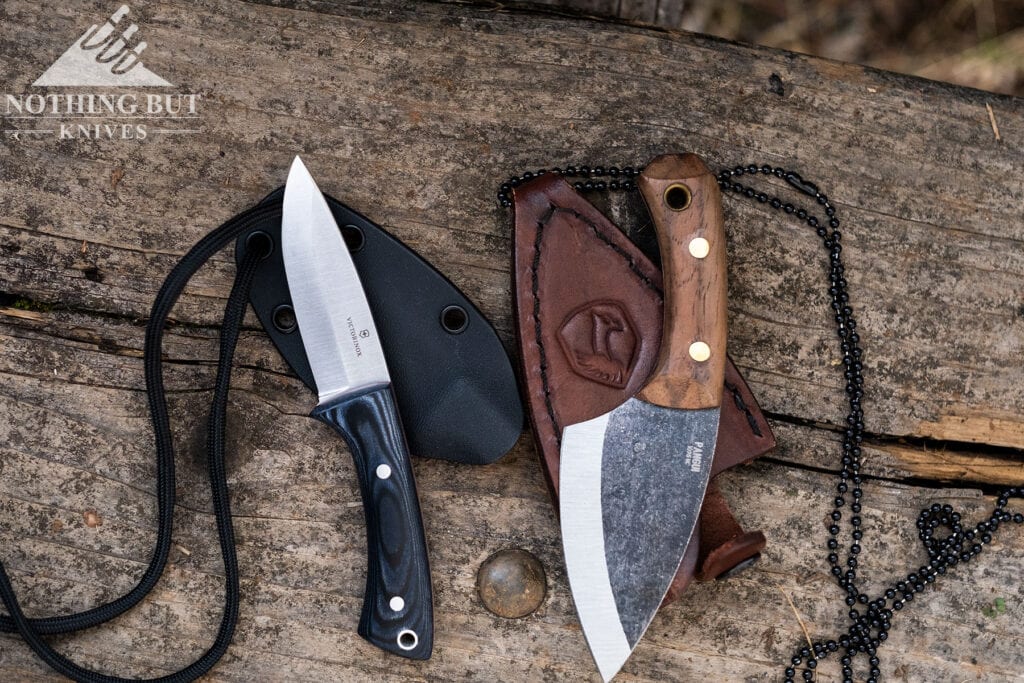
Our own use tends toward camping and light EDC stuff, but I talked to those weird people who are really into backpacking, and the even weirder people who see every knife as a tactical puzzle waiting to be solved.
We’ve included neck knives in a broad price range from low-cost to high-end to make sure this article offers an option for any budget. Feel free to comment below with recommendations of something you’ve handled personally that I may have overlooked.
Here Are Our Top Picks for Neck Knives with Secure Sheaths
EDC Neck Knives
You don’t usually see people carrying a tiny fixed blade as an EDC, but it’s not an unreasonable idea.
It’s handy to have a blade hanging around your neck or sitting scout carry so you don’t have to worry about arranging a bunch of stuff in your pocket. It’s also handy if you’re wearing sweatpants that don’t hold pocket knives very well.
Kizer Deckhand D2
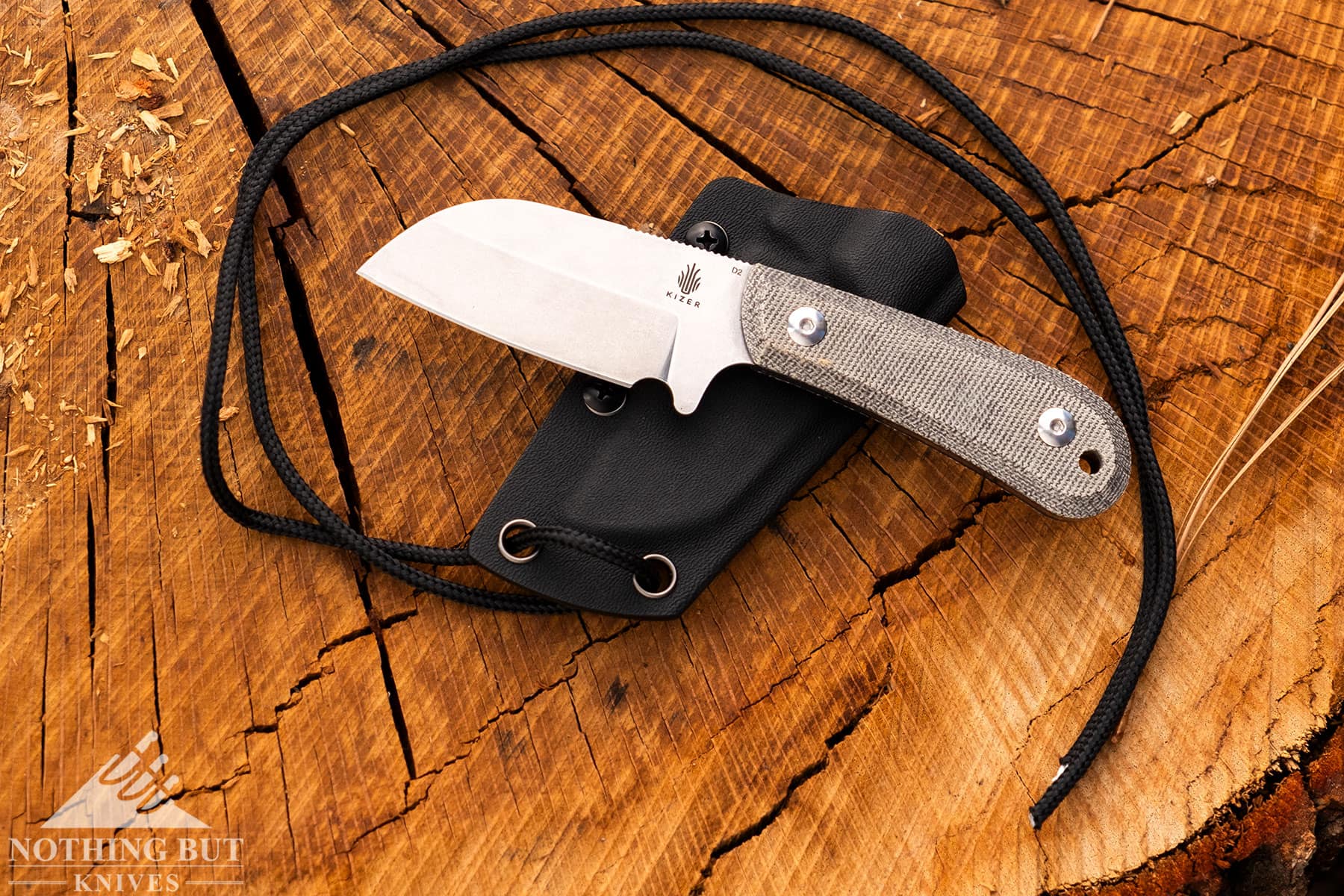
| Overall Length: | 6.34” |
| Blade Length: | 2.95” |
| Steel: | D2 |
| Handle Length: | 3.39” |
| Grind: | Flat |
| Build: | Full Tang |
| Sheath: | Kydex |
| Weight: | 3.7 oz |
| Price Range: | $49 – $59 |
The Deckhand stands out from the crowd of other neck knives thanks to its sheepsfoot blade. The added safety this shape gives makes it popular with boaters, but it is also a practical shape for yard work camping tasks. I have also found Sheepsfoot blades a little faster and easier to sharpen than most other blade shapes.
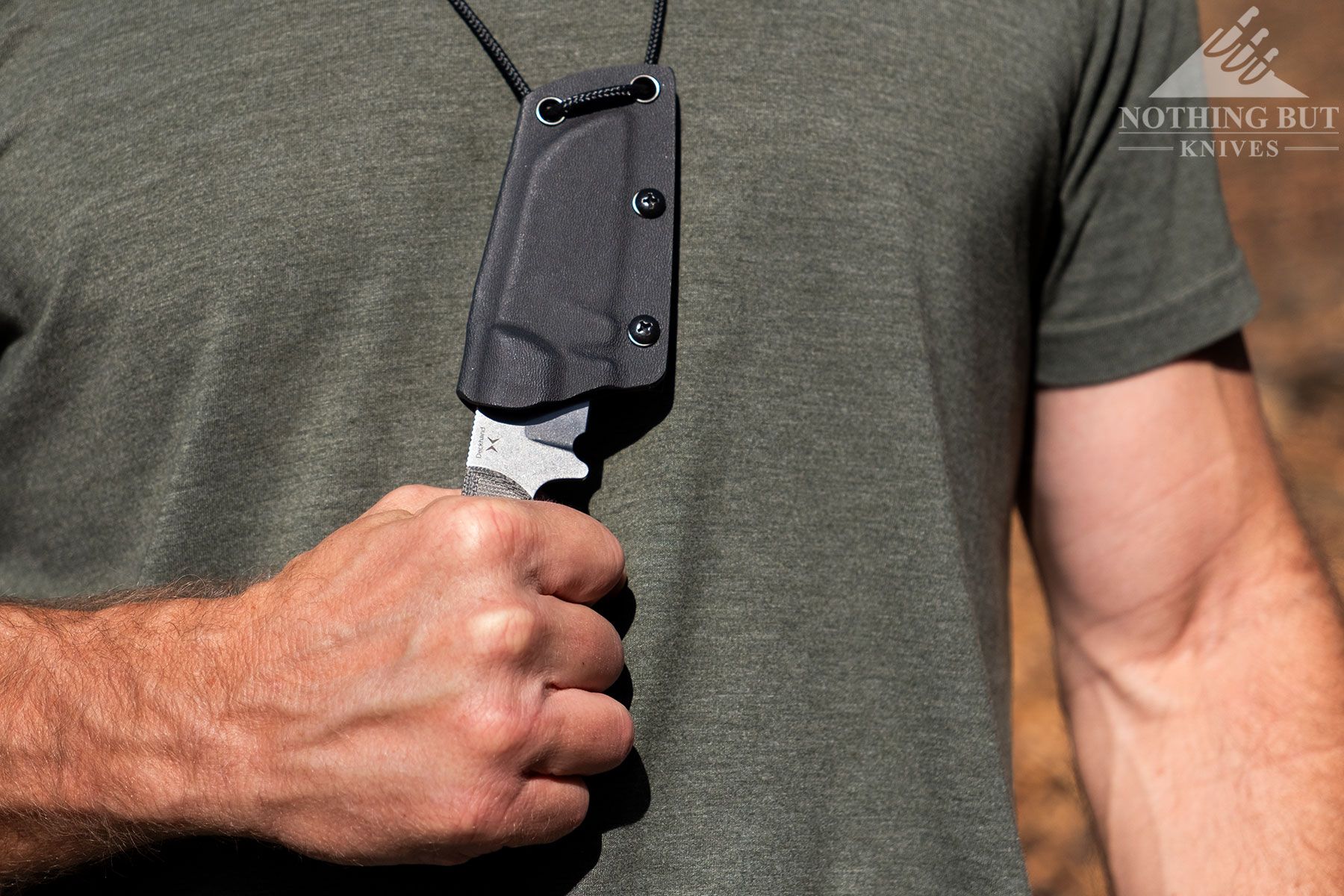
The Micarta handle scales of the Deckhand we tested for this article proved to be quite comfortable for all types of tasks including hard-use stuff that required a lot of pressure. If Micarta is not your thing, the Deckhand is also available in G10.
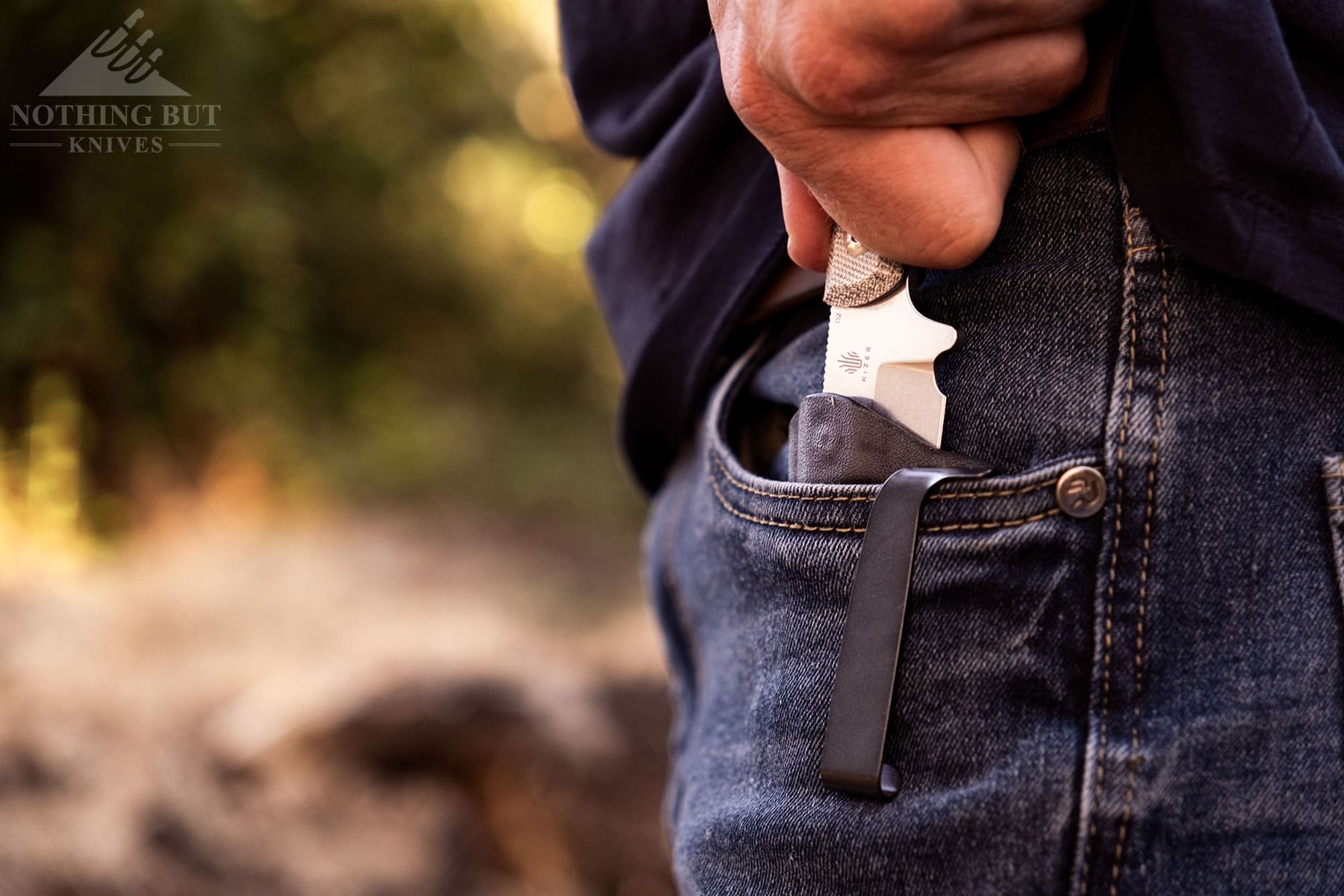
At six inches this fixed blade is pushing the limits of comfortable carry around the neck, but I found it to be small and light enough to be easily unnoticed when not in use.
The knife world needs more hard-use style neck knives, and Kizer nailed it with the Deckhand. This knife can also be configured for belt or pocket carry thanks to the versatility of the included sheath.
Off Grid All-Day Fixie
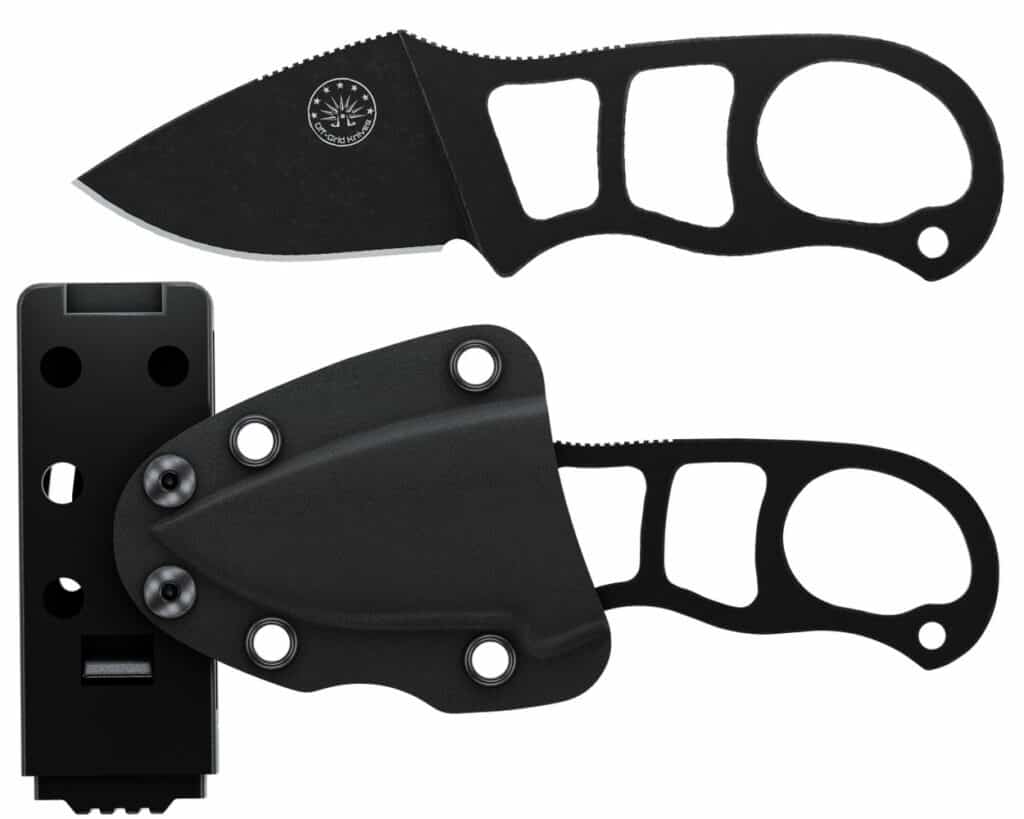
| Overall Length: | 5.25” |
| Blade Length: | 2.25” |
| Steel: | Cryo D2 |
| Handle Length: | 3.0” |
| Grind: | Flat |
| Build: | Skeleton |
| Sheath: | Kydex |
| Weight: | 1.5 oz |
| Price Range: | $60 – 70 |
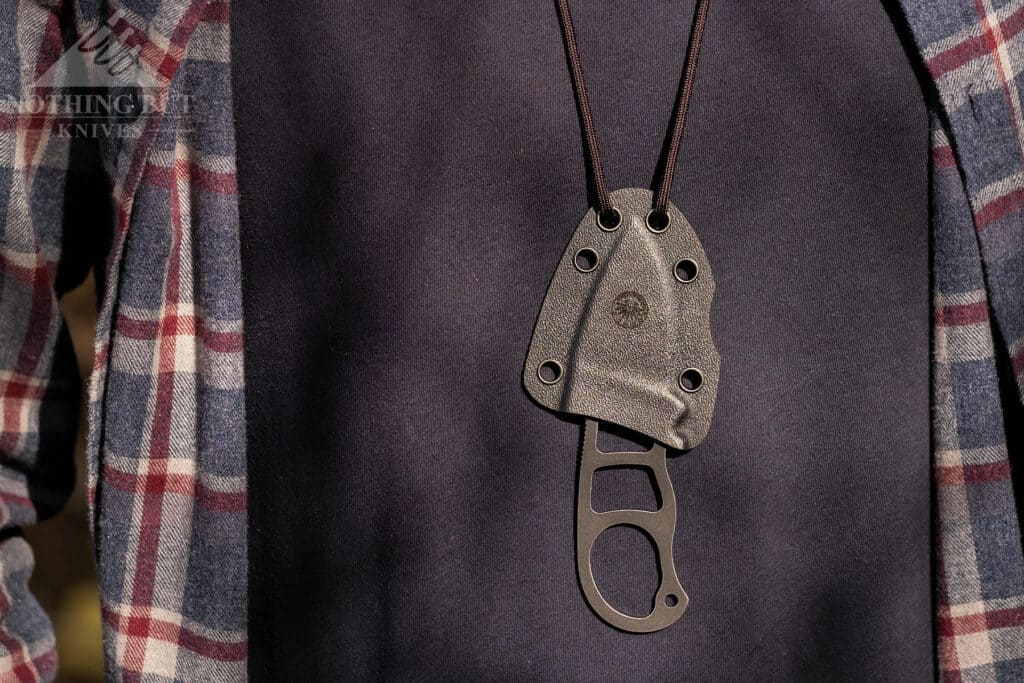
The ergonomics on the All Day Fixie are really well thought out. While it has the hard-angled feeling of a skeletonized handle, it’s pretty easy to use in a three-finger grip, a sabre grip, or a detail grip with the index finger along the spine.
It’s also one of the lighter knives on this list, so it’s pretty comfortable around the neck, and even though the sheath is fairly simple, the retention is good and the angled way it fits in is a good extra assurance that it won’t fall out by accident.
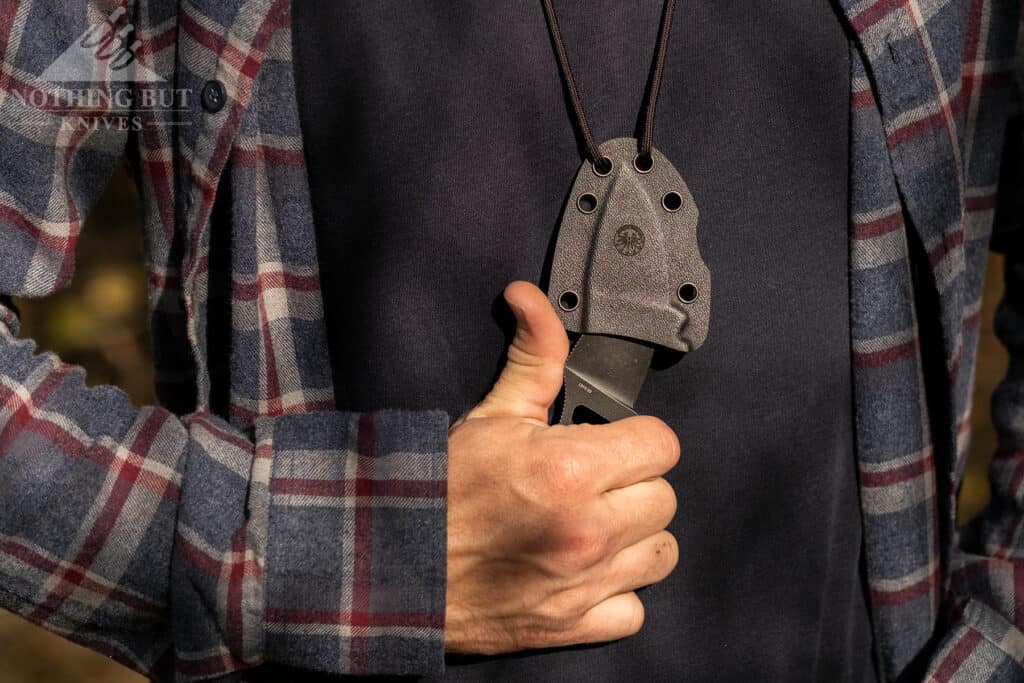
The real attraction of this knife is that the blade is screamingly sharp. It might only be a 2-inch triangle, but it’s super thin behind the edge.
Anything you could want to cut with this thing, you’ll be able to, whether you’re skinning small game or cutting out your favorite section of the newspaper.
It won’t reconcile the fact that you’re still reading physical newspapers for some reason, but you can be sure the lines will stay straight for as long as your hand can stay steady.
Schrade SCH57
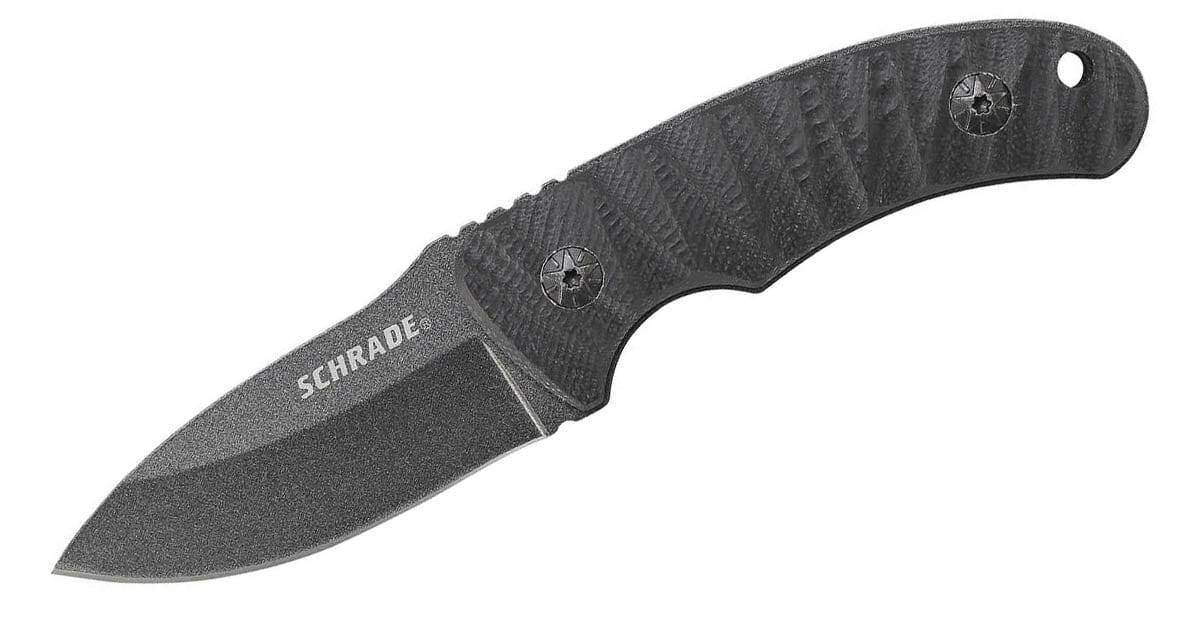
| Overall Length: | 6.125″ |
| Blade Length: | 2.5″ |
| Steel: | 65Mn |
| Blade Style: | Drop point |
| Handle Length: | 3.625″ |
| Handle Material: | G-10 |
| Grind: | Hollow |
| Build: | Full tang |
| Sheath: | Polymer |
| Weight: | 3.94 oz |
| Price Range: | $15 – 20 |
This is one of those highly efficient, cost-effective designs that makes you wonder why every other company hasn’t made a version of this.
It’s tough, reliable, takes a good edge, and stays around the $20 mark. The amount of abuse it can take is limited only to its size and your willingness to endanger your hand.
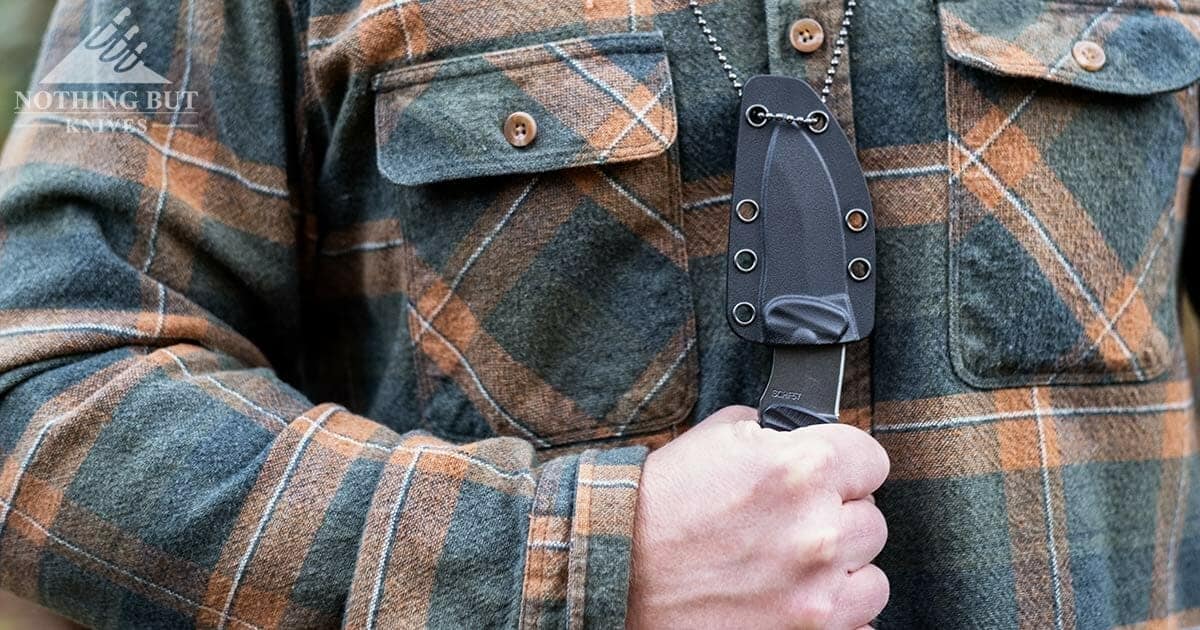
It comes with a pancake-style polymer sheath and a clip that works well enough for vertical or horizontal carry, but if you pull a cord through the sheath and wear it around the neck it feels a lot more at home.
This is also one of the few neck knives that actually has a comfortable grip just by virtue of being thicker than usual, so it’s actually pleasant to cut and whittle with.
It’s also one of the heavier knives on this list, coming in at nearly 4 ounces. If you’re backpacking that could be a big issue. Or if you’re just planning on wearing it on your neck all day, there’s a better chance it will start feeling irritating, depending on what kind of cord or chain you’re using.
From a versatility standpoint the SCHF57 is tough to beat. It can be worn around the neck or a belt. If you opt for belt carry you have the option of vertical or horizontal carry.
CRKT S.P.E.W.
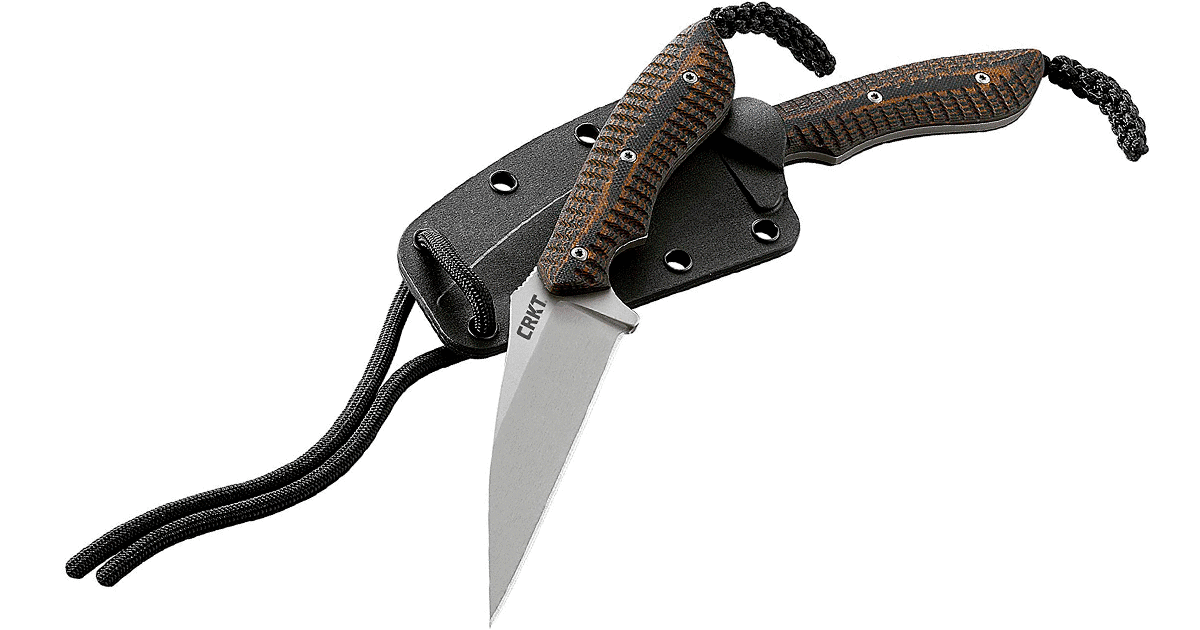
| Overall Length: | 6.25″ |
| Blade Length: | 3.0″ |
| Steel: | 5Cr15MoV |
| Blade Style: | Wharncliffe |
| Handle Length: | 3.25″ |
| Handle Material: | G-10 |
| Grind: | Hollow |
| Build: | Full tang |
| Sheath: | Kydex |
| Weight: | 1.80 oz |
| Price Range: | $20 – 30 |
This is a fishing knife if I ever saw one, but it’s also one of the few neck knives I have that I still carry regularly for EDC.
The combination of a non-threatening blade shape and a sheath that can go horizontal makes it a pretty easy knife to carry around town.
Plus that fine point is great for a lot of aggravating problems you run into throughout the day like knots and slivers and the occasional overbuilt plastic package.
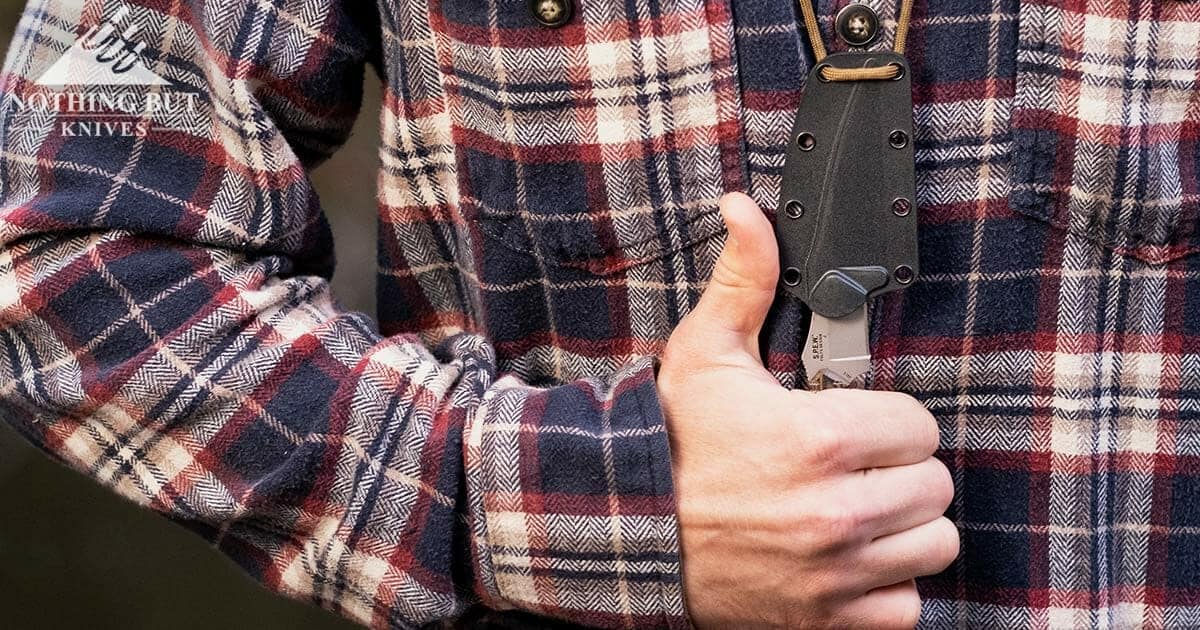
One possible problem with the sheath is that the belt loop is pretty small, which is the other reason I label it as a simple EDC. Out of the package, this will only fit on a regular belt. It’s light enough to put on the odd strap, but don’t expect to be able to strap this to a tactical belt.
The other option, of course, is to wear it around your neck. The sheath doesn’t have incredible retention, but the knife is light enough not to cause problems unless you’re going through thick terrain where things might be catching and pulling on your torso.
Lately, though, I’ve just been carrying it in my pocket behind my wallet. It’s the only knife I’ve ever carried this way, but it seems to work well, although it can be a legal issue if your pocket is big enough to hide the handle. So keep that in mind.
Check out our full review of the CRKT Spew if you think it looks interesting.
Boker Magnum Li’l Friend
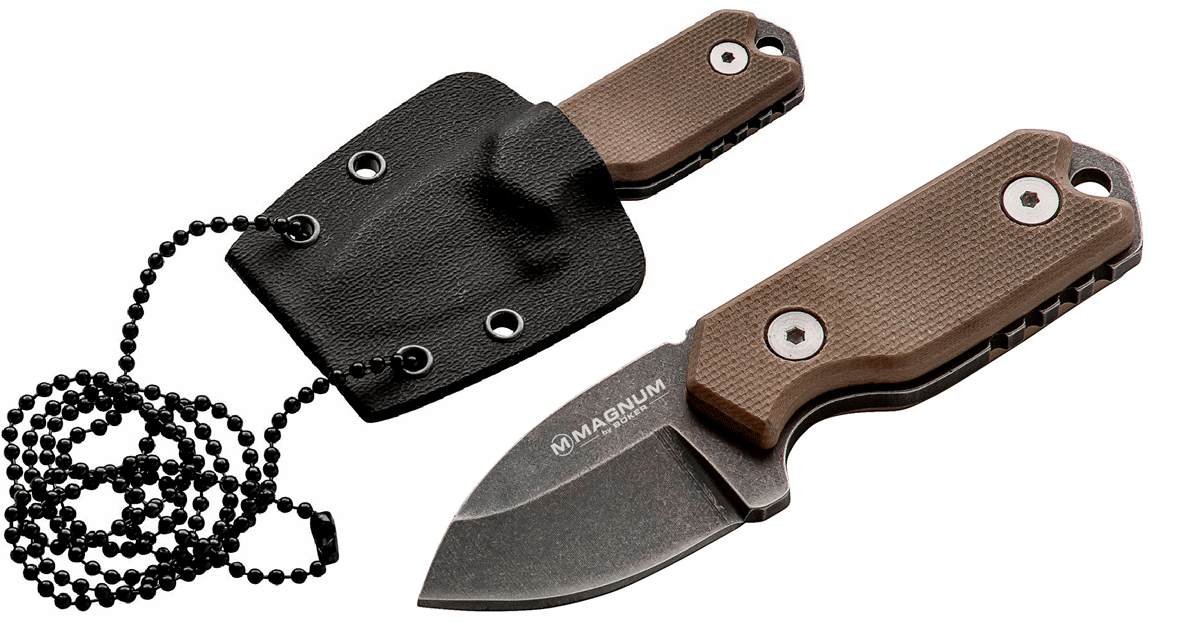
| Overall Length: | 3.375″ |
| Blade Length: | 1.375″ |
| Steel: | 440 |
| Blade Style: | Drop point |
| Handle Length: | 2.0″ |
| Handle Material: | G-10 |
| Grind: | Hollow |
| Build: | Full tang |
| Sheath: | Kydex |
| Weight: | 1.34 oz |
| Price Range: | $20 – 30 |
It’s really important that you take note of the size of this knife. No product photo can really convey how small it actually is.
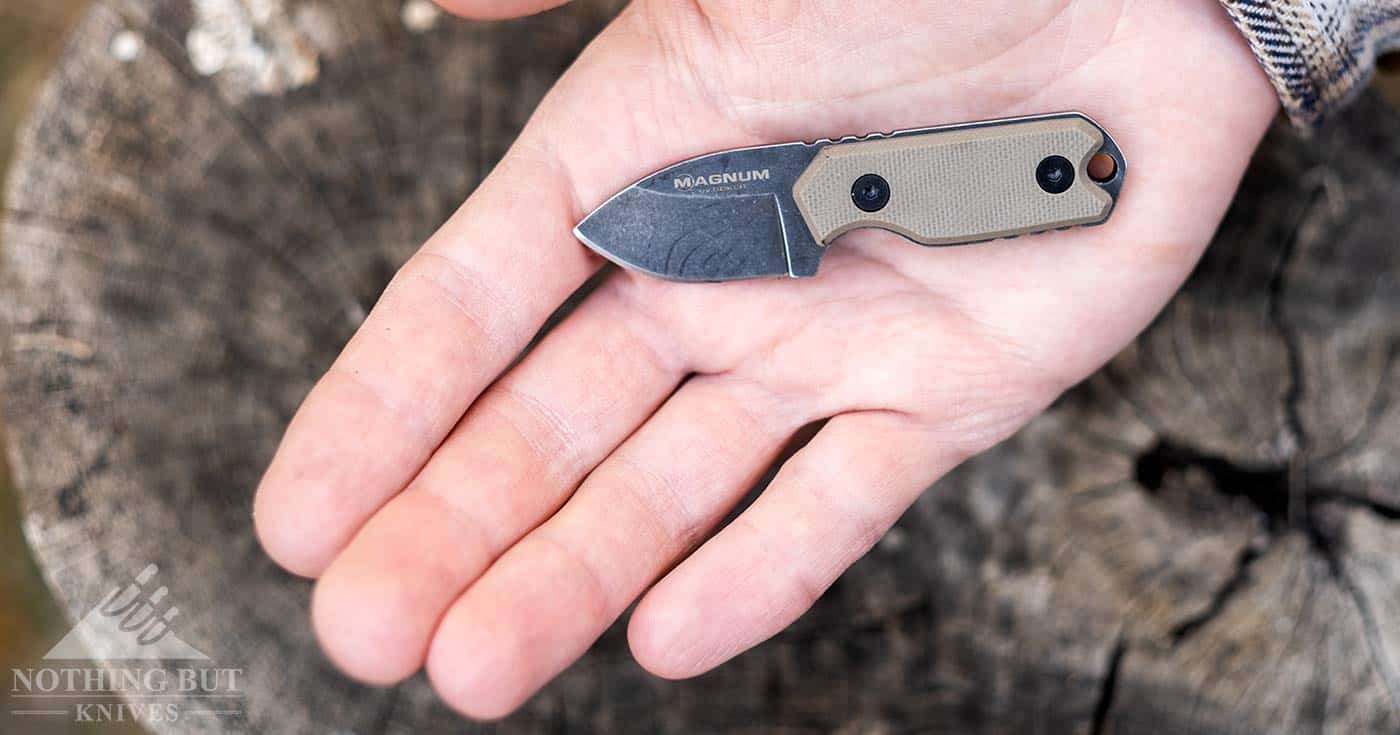
But also, don’t let the size fool you. It’s tiny, but it has a mean point with a sharp edge. There are plenty of things you could pry, scrape, poke, and cut with it. It’s pretty stout for its size, and it’s so light it almost feels like nothing is there when you’re wearing it.
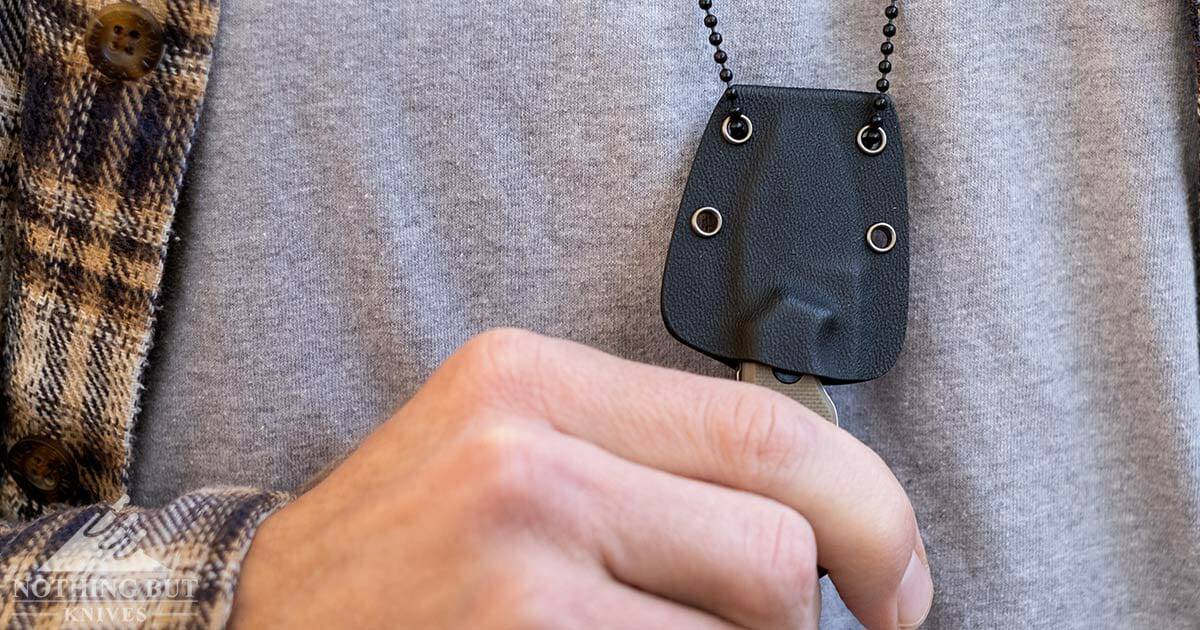
This might be one of the most interesting and surprisingly useful knives in the Boker Magnum line, but that’s not saying a whole lot.
Magnum is Boker’s budget line, and they pump out a ton of designs that are hit or miss. The Li’l Friend is one of their odd hits in a big sea of misses, and that’s mostly because they were clever enough to go small and rustic. As a result, this thing is really tough and takes a sharp edge.
I’ve read a few complaints that the scales have a habit of coming loose over time. After carrying it, I can’t imagine how I would use it hard enough to make that happen, but it’s worth keeping an eye on that, and having a torx screwdriver ready, or just redo the screws with some lock-tite and you’ll have fixed up a larger issue on an otherwise handy little knife.
Backpacking and Bushcraft Neck Knives
This really feels like the optimal way to use a neck knife. Backpacking is all about cutting weight and finding ergonomic ways to carry everything you need, and those are both areas in which neck knives excel.
Here are some of the lightest neck knives we could find that come with a trustworthy sheath.
Esee Izula ii
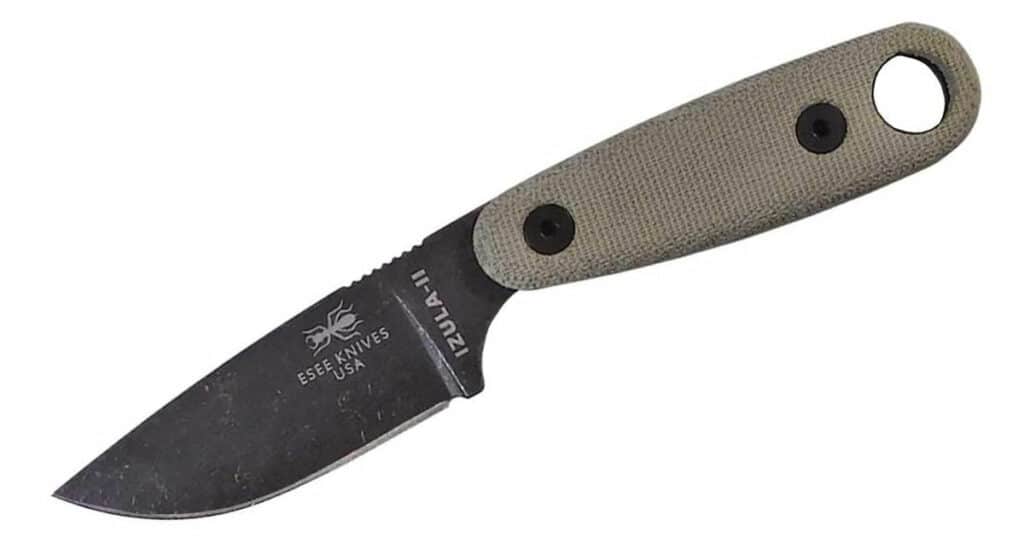
| Overall Length: | 6.75″ |
| Blade Length: | 2.875″ |
| Steel: | 1095 |
| Blade Style: | Drop point |
| Handle Length: | 3.88″ |
| Handle Material: | Micarta |
| Grind: | Flat |
| Build: | Full tang |
| Sheath: | Injection Molded |
| Weight: | 3.30 oz |
| Price Range: | $79 – $112 |
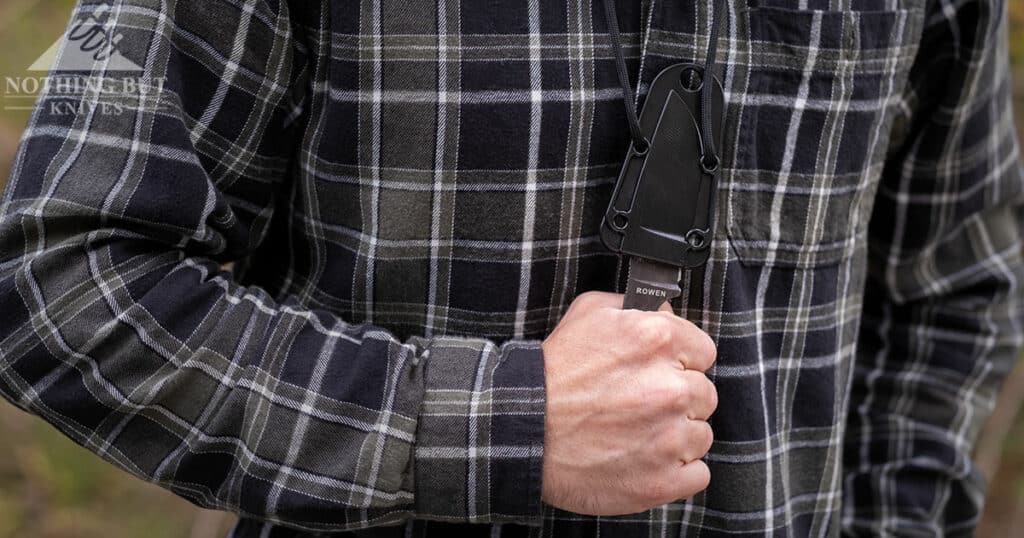
It is always nice when a good knife gets an upgrade that makes it a great knife. The Esee Izula II is one of those knives.
The original version had a skeleton handle that was practical, but not super comfortable. This version has super comfy removable Micarta handle scales that make this knife a great option as a small survival/camping type knife. ESEE also added a half inch to the version 2’s blade to make it a little more capable around the campsite.
The injection molded sheath of the Izula 2 is really versatile. It can be worn as a neck knife, or set up for horizontal or vertical carry on a person’s belt using the included clip. There are only two bolts involved, so it is pretty east to convert in the field even if a campfire is your only light source.
You might also notice that the bolster seats into the sheath, and gets a pretty good fit in there, so this is about as secure as a neck knife sheath can get short of adding secondary retention.
Victorinox Outdoor Master Mic S
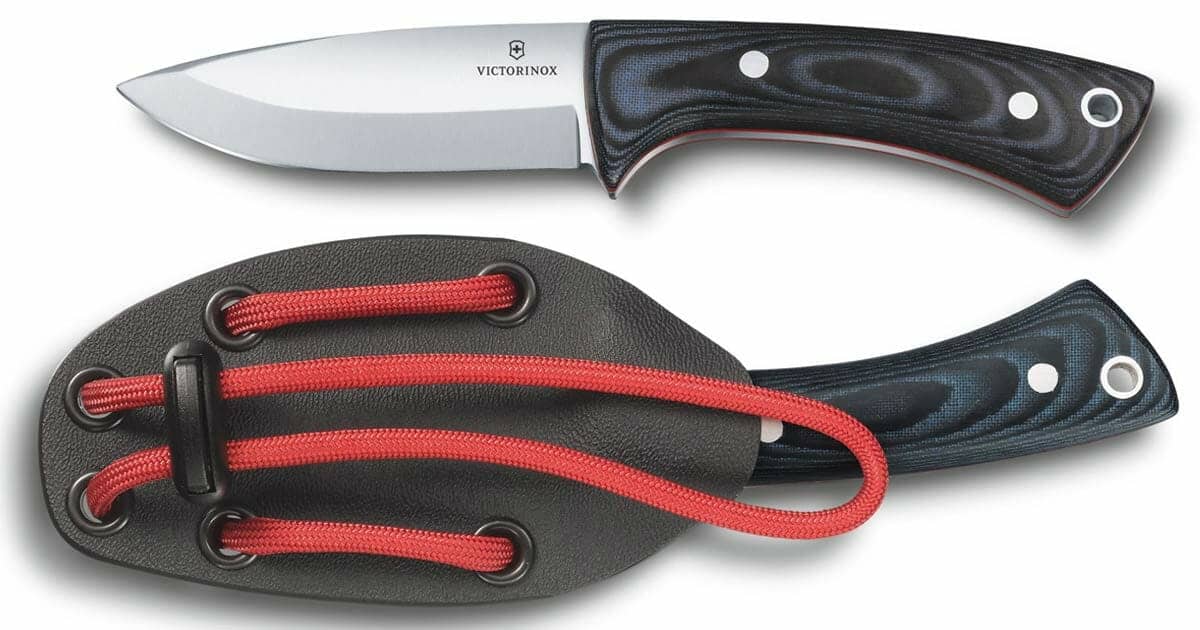
| Overall Length: | 6.0″ |
| Blade Length: | 2.75″ |
| Steel: | 1.4116 |
| Blade Style: | Drop point |
| Handle Length: | 3.25″ |
| Handle Material: | Micarta |
| Grind: | Scandi |
| Build: | Full tang |
| Sheath: | Kydex |
| Weight: | 2.71 oz |
| Price Range: | $140 – 150 |
As far as I know this knife wasn’t designed for any specialized use, but there’s not a whole lot it couldn’t do between the stout blade and scandi grind.
It might not look or feel sharp at first but this is one of the sliciest knives I own. Which just goes to show how important the grind is. This is a ridiculously tough and useful little thing.
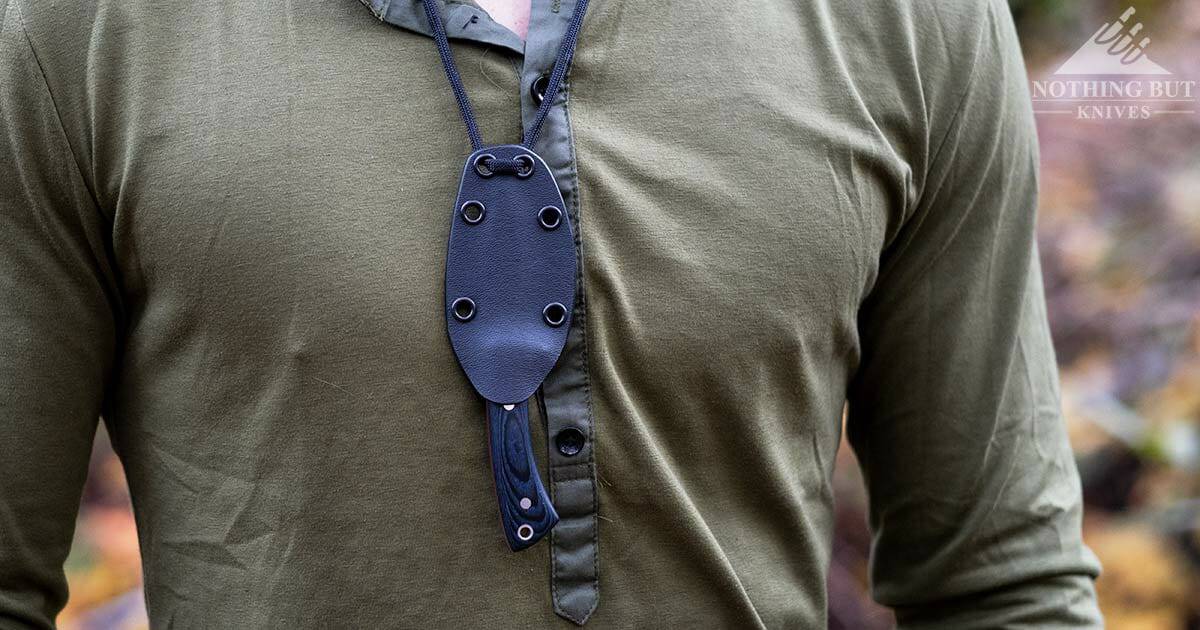
There’s a little bit of assembly required. The cord it comes with isn’t long enough to wear around your neck. I think it’s supposed to just make it easier to pull out of your pocket or bag. But it’s easy to switch out, plus the sheath is compatible with Tek-Lok, so you have a huge range of ways to carry this little, unassuming monster.
It’s also almost as comfortable as the Schrade SCH57, but has a much better blade that’s a lot nicer to use for whittling and carving. It’s a fantastic camping buddy.
The sheath is a simple pancake style Kydex, it kept a good grip on the knife through a fair bit of hiking. I have to admit that this feels like it has the loosest retention of any neck we’ve allowed onto this article so far. It stayed put through hiking, and a few days of EDC, but I have to admit I’m the most nervous about this one popping out someday.
Southern Grind Jackal Pup
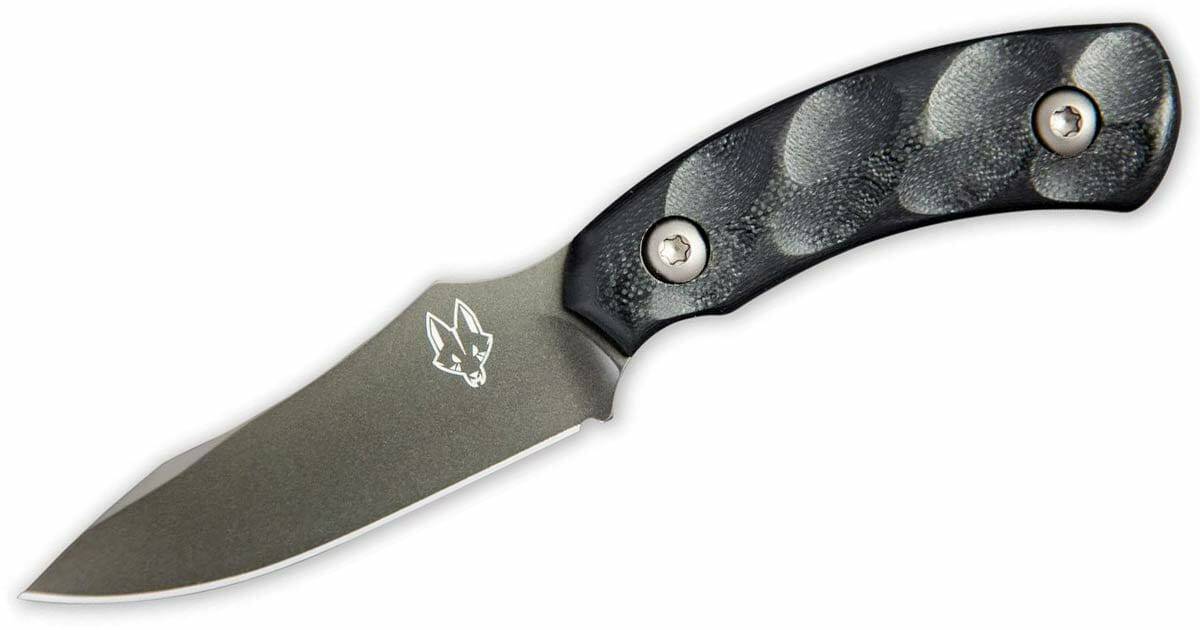
| Overall Length: | 5.75″ |
| Blade Length: | 2.75″ |
| Steel: | 8670M |
| Blade Style: | Drop point |
| Handle Length: | 2.8″ |
| Handle Material: | G-10 |
| Grind: | Flat |
| Build: | Full tang |
| Sheath: | Kydex |
| Weight: | 2.78 oz |
| Price Range: | $125 – 169 |
The Southern Grind Jackal Pup excellent as a neck knife, but it can also be carried vertically or in the scout position on a belt.
It sports a super practical design, an excellent Kydex sheath, and a blade made of 8670M steel. That’s a pretty tough high carbon steel that you don’t see in production knives much these days. It’s hardy stuff, you just have to remember to dry it after use.
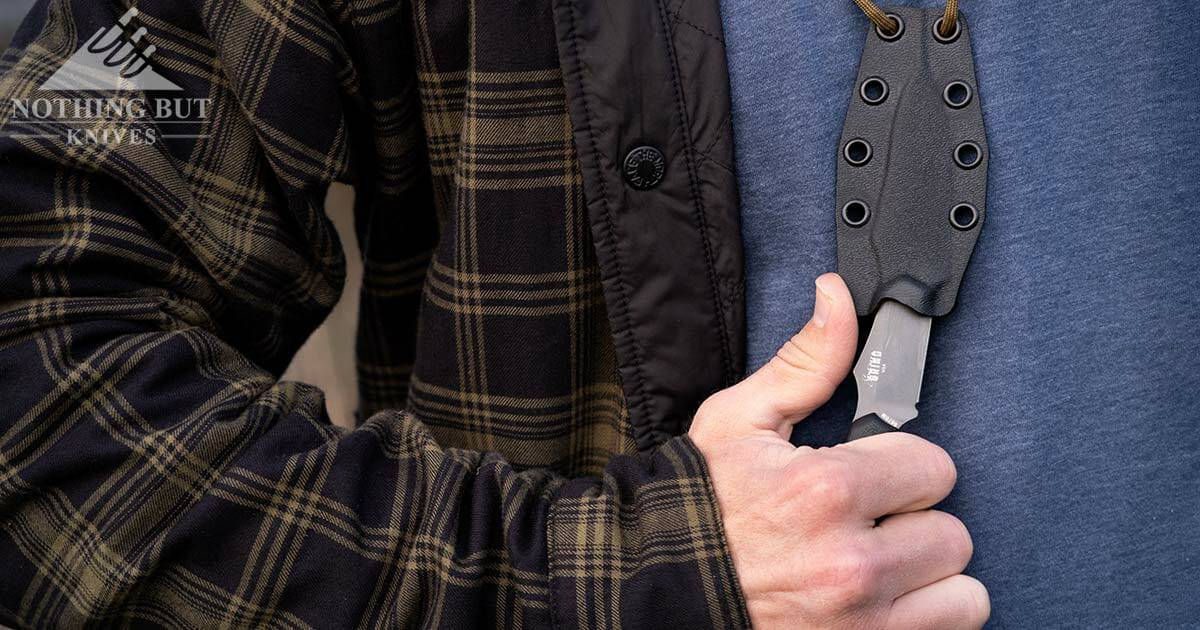
The Jackal Pup is just large enough to be practical for camping and fishing related tasks which is a big part of why it has become so popular.
The handle actually reminds me a little of the CRKT SPEW, but it’s a lot grippier, and the concave grind in the spine make sabre grips feel a lot more natural.
The pancake-style Kydex sheath is simple, but it has tight retention. That’s helped a lot by the weight of the knife, and the rise in the spine. That sheath has a lot of angles to hold onto, so the Jackal Pup stays put no problem.
Morakniv Eldris
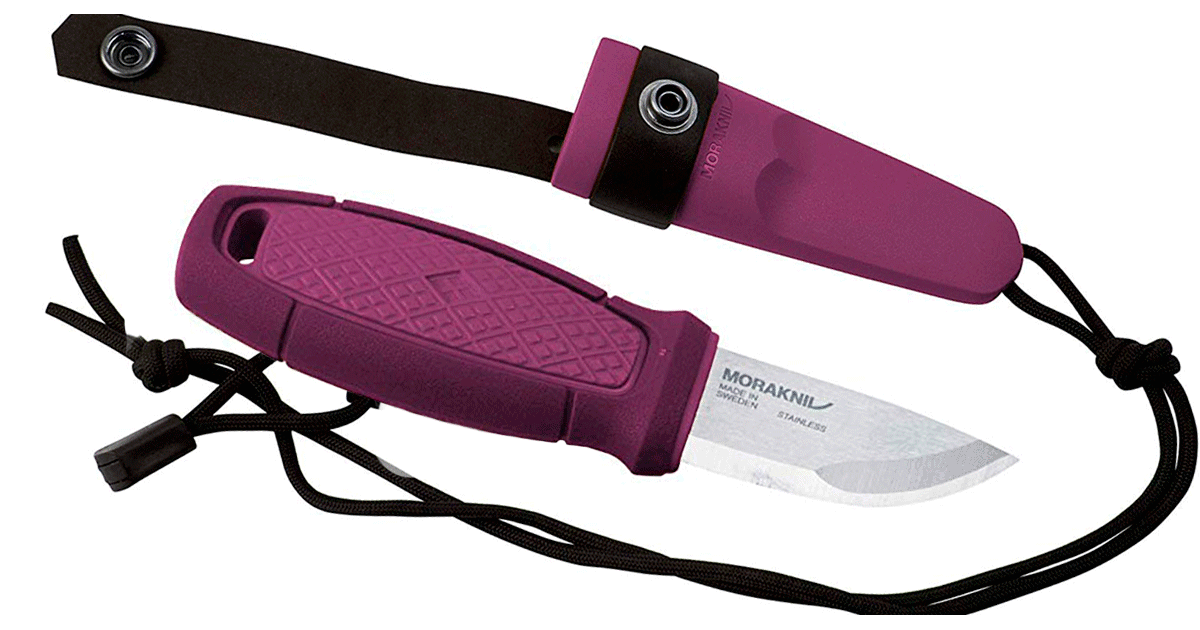
| Overall Length: | 5.6″ |
| Blade Length: | 2.2″ |
| Steel: | 15C27 |
| Blade Style: | Standard |
| Handle Length: | 3.4″ |
| Handle Material: | Polypyrene |
| Grind: | Scandi |
| Build: | 3/4 tang |
| Sheath: | Polymer |
| Weight: | 2.15 oz |
| Price Range: | $25 (standard) / $50 (With neck kit) |
This one takes a little assembly, but the Eldris is a pretty fantastic neck knife for light cutting (or heavy prying, if you’re that kind of person), but the neck kit is sold separately. Without that, the Elrdris is basically just a tiny knife with a cheap plastic sheath that goes in your pocket or pack.
The neck kit lets you hang it around your neck, though, and adds a leather strap that snaps closed to keep the knife contained.
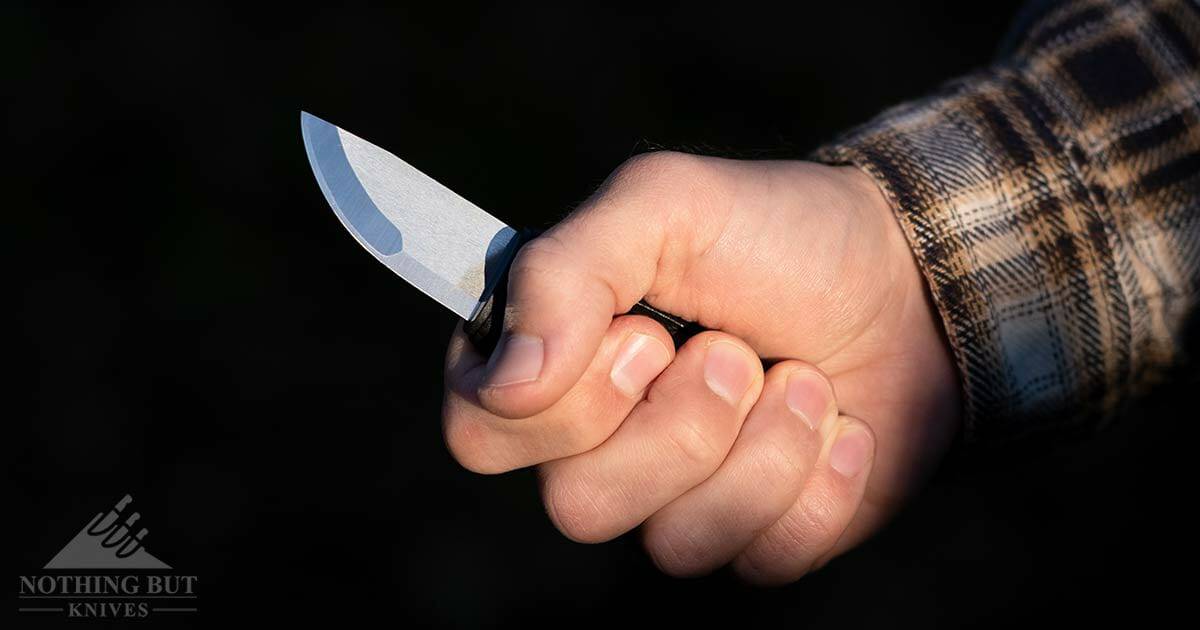
Once you have that figured out, this is a neat little blade for sparking on a ferro rod or doing a little carving. A blade this short might not be good for everything, and since it sits in a snap enclosure it’s the opposite of a fast-deployment design, but usually the only limit to what you can do with any Mora knife is your imagination.
Ka-Bar Esee BK14
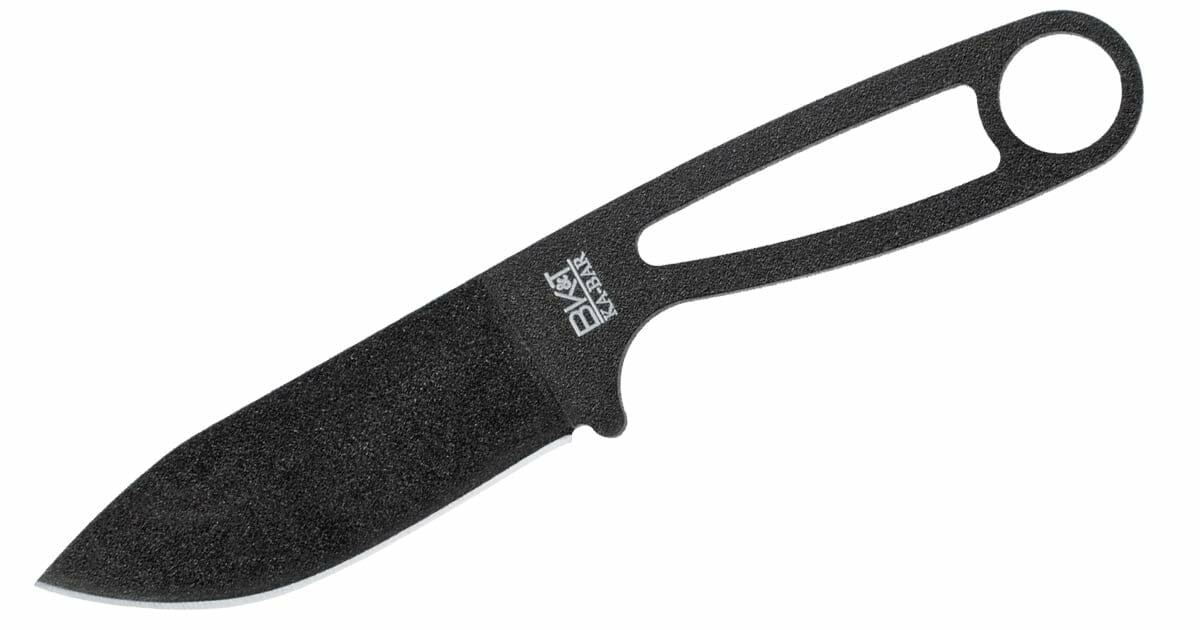
| Overall Length: | 7.0″ |
| Blade Length: | 3.25″ |
| Steel: | 1095 Cro-Van |
| Blade Style: | Drop point |
| Handle Length: | 3.75″ |
| Handle Material: | Steel |
| Grind: | Flat |
| Build: | Skeleton |
| Sheath: | GFN |
| Weight: | 3.0 oz |
| Price Range: | $45 – 50 ($60 – 70 with scales) |
This is an amalgamation of the ESEE Izula and the Ka-Bar Becker Necker.
It’s hard to understate the appropriate level of excitement people should feel about an ESEE / Ka Bar collaboration.
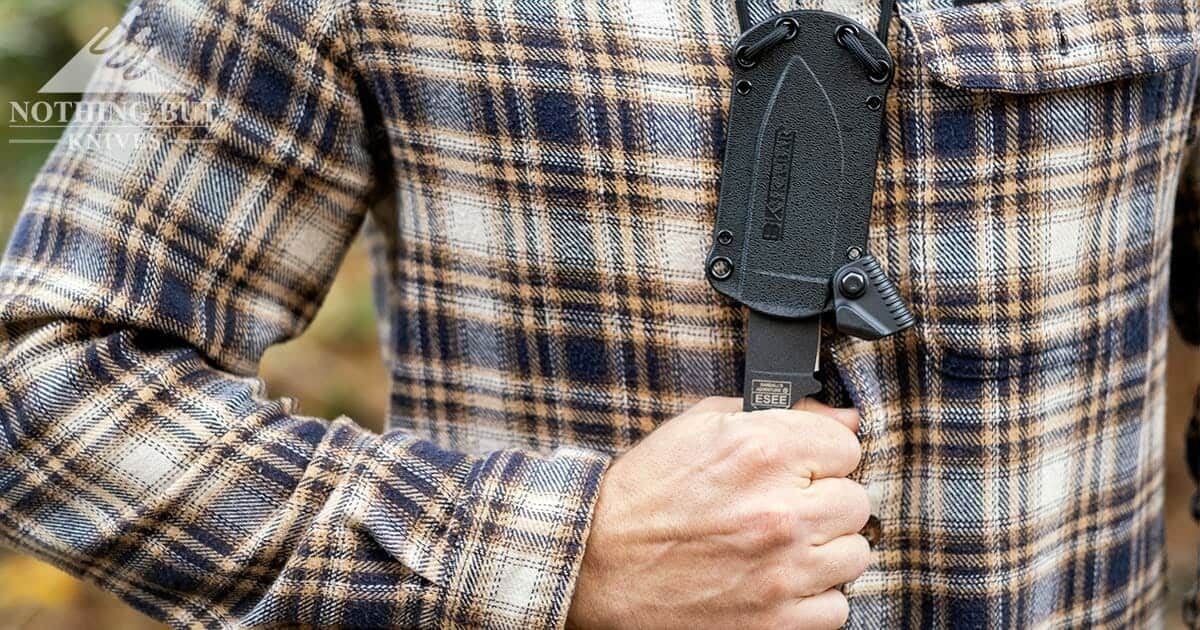
If you really want to see what this knife can do, it’s a two step process: get the knife, then get the handle set scales. It’s a fine enough knife without them, and it even rides a little easier around the neck just as a skeleton knife, but there’s a massive difference in cutting ability just from the way your hand ends up holding it.
More importantly, the sheath is MOLLE compatible and has a retention tab to keep the knife in place. After a bit of practice with this set up around your neck, the deployment can get pretty fast.
Camping & Hunting Neck Knives
Depending on what kind of hunting you’re doing, a smaller knife that rides easy is almost essential.
There are a lot of designs for bow hunters who run after game a lot, but if you’re also one to sit up in trees or other tight spaces while you wait for your shot, these knives should come in pretty handy.
CRKT Minimalist
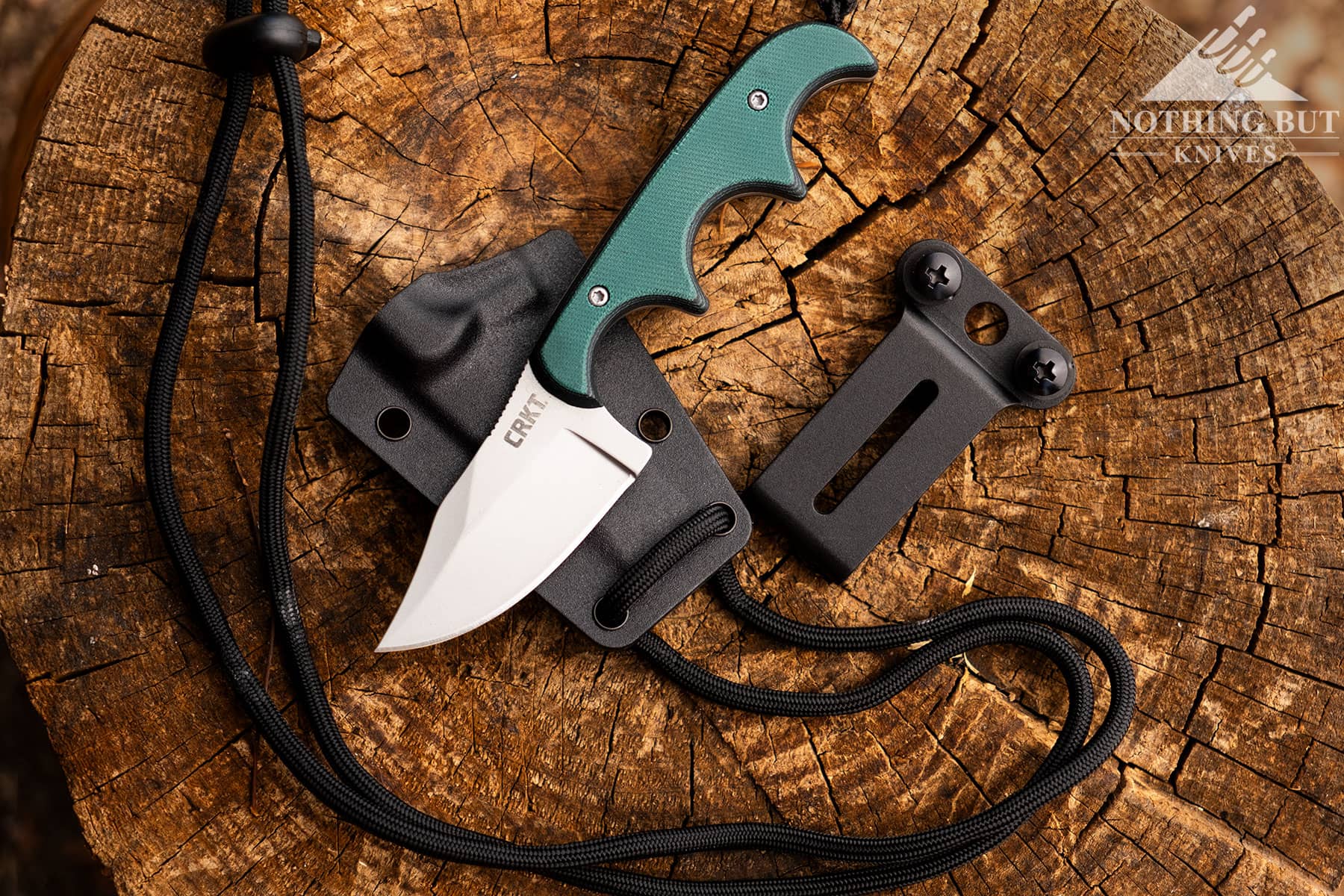
| Overall Length: | 5.13″ |
| Blade Length: | 2.13″ |
| Steel: | 5Cr15Mov Stainless Steel |
| Blade Style: | Clip Point |
| Handle Length: | 3″ |
| Handle Material: | G-10 |
| Grind: | Hollow |
| Build: | Full tang |
| Sheath: | Zytel |
| Price Range: | $30 – 39 |
For getting the strongest grip in as little space as possible, the CRKT Minimalist is tough to beat.
For under $50, this knife gets you a good three-finger grip (kinda four with the fob), just enough edge for opening boxes, and a couple options for carrying.
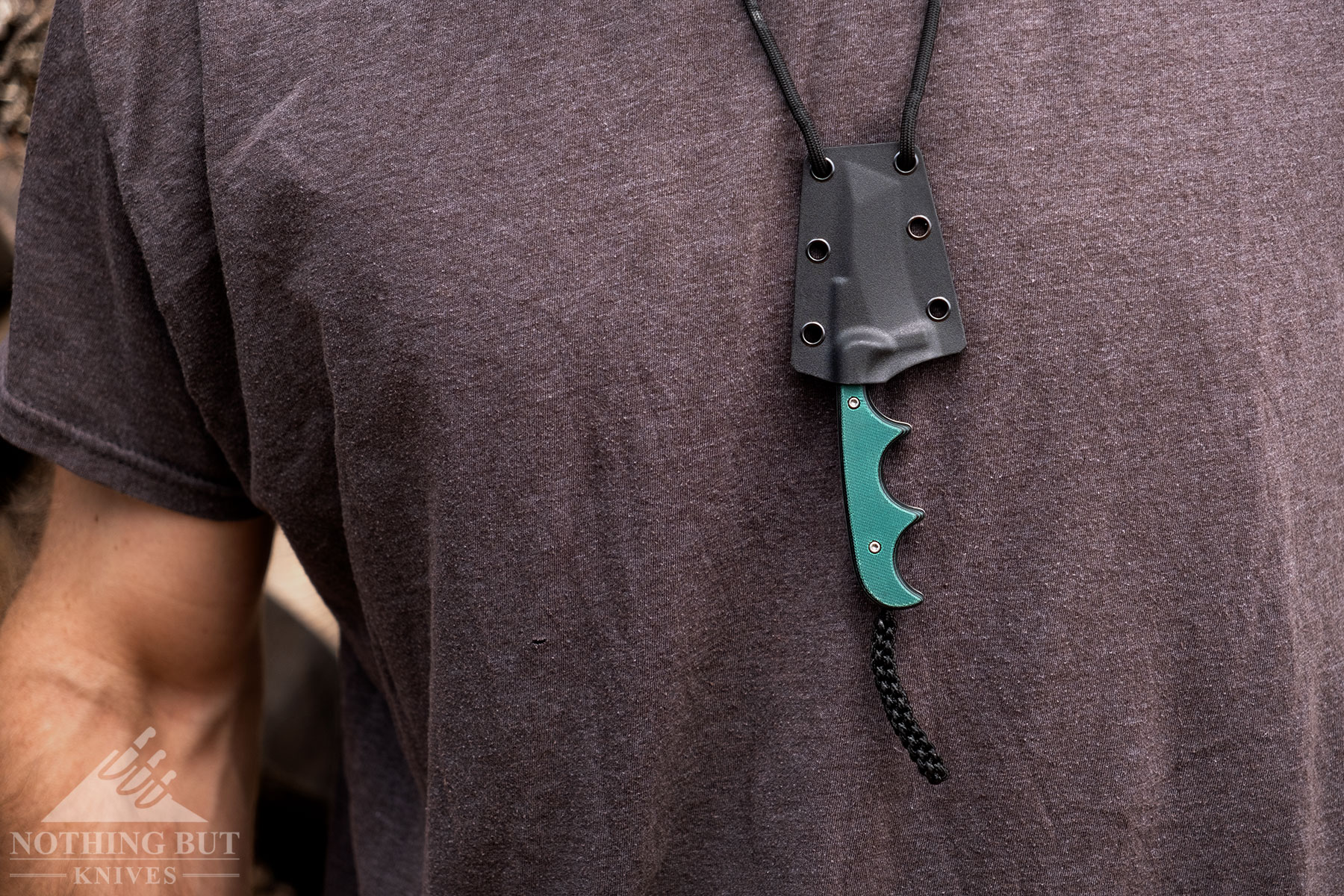
We don’t normally go in for knives with handles that are shaped this aggressively, but the designer Alan Folts seems to know what he’s doing. The handle fits medium to large-size-glove hands just fine.
The steel isn’t turning any heads, and won’t have the best edge retention, but there’s plenty of utility in the blade shape, and it’s not really a big deal to maintain an edge this size at this price.
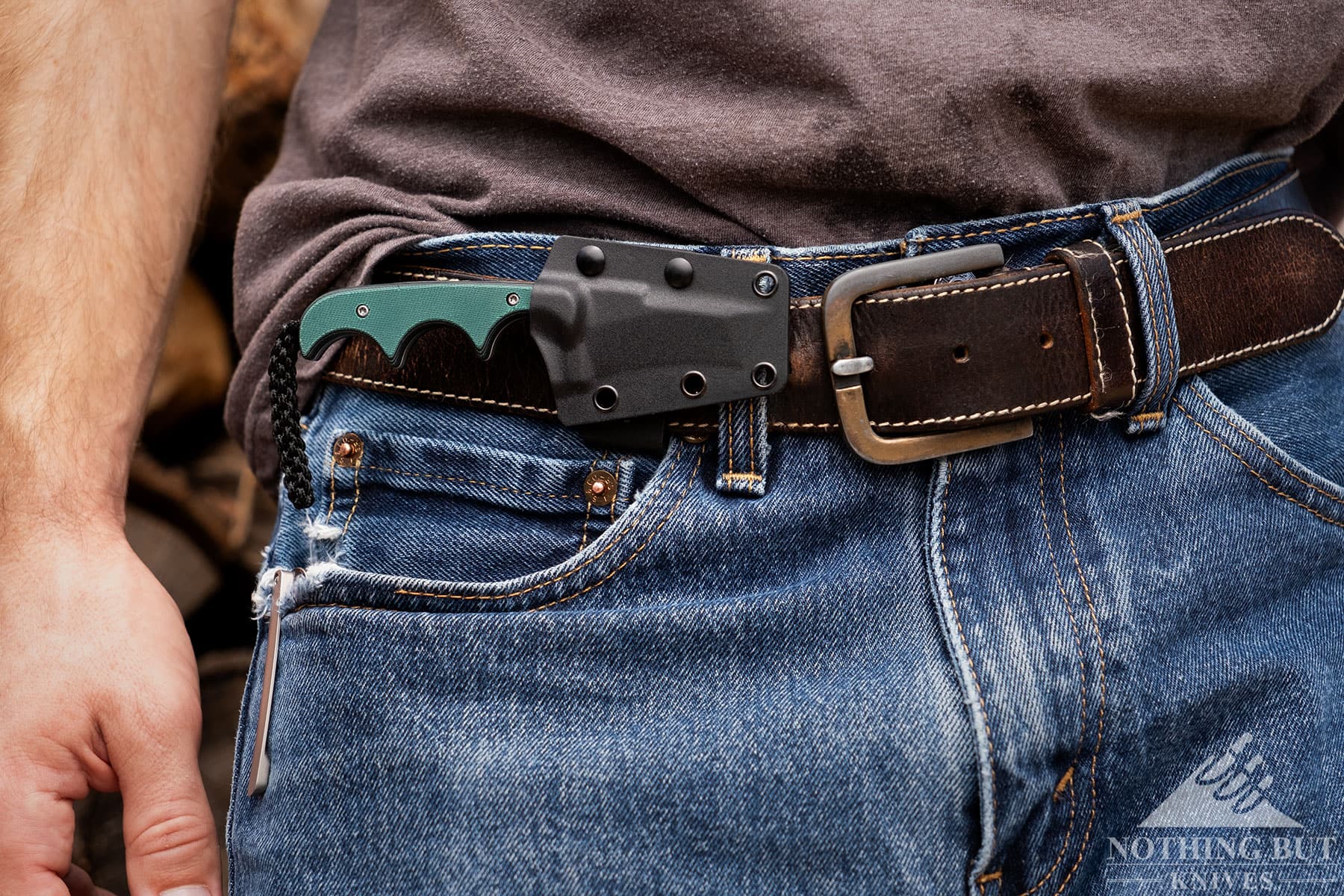
The important bit here, though, is that the sheath feels like it’s just keyed in right for the weight of the knife. It’s almost too loose, but the knife is so light, that grip doesn’t need (and maybe shouldn’t) have a death grip.
Deployment happens very quickly, though, thanks partly to that keyed-in retention, but mostly to the long handle that’s so easy to grab onto.
QSP Neckmuk
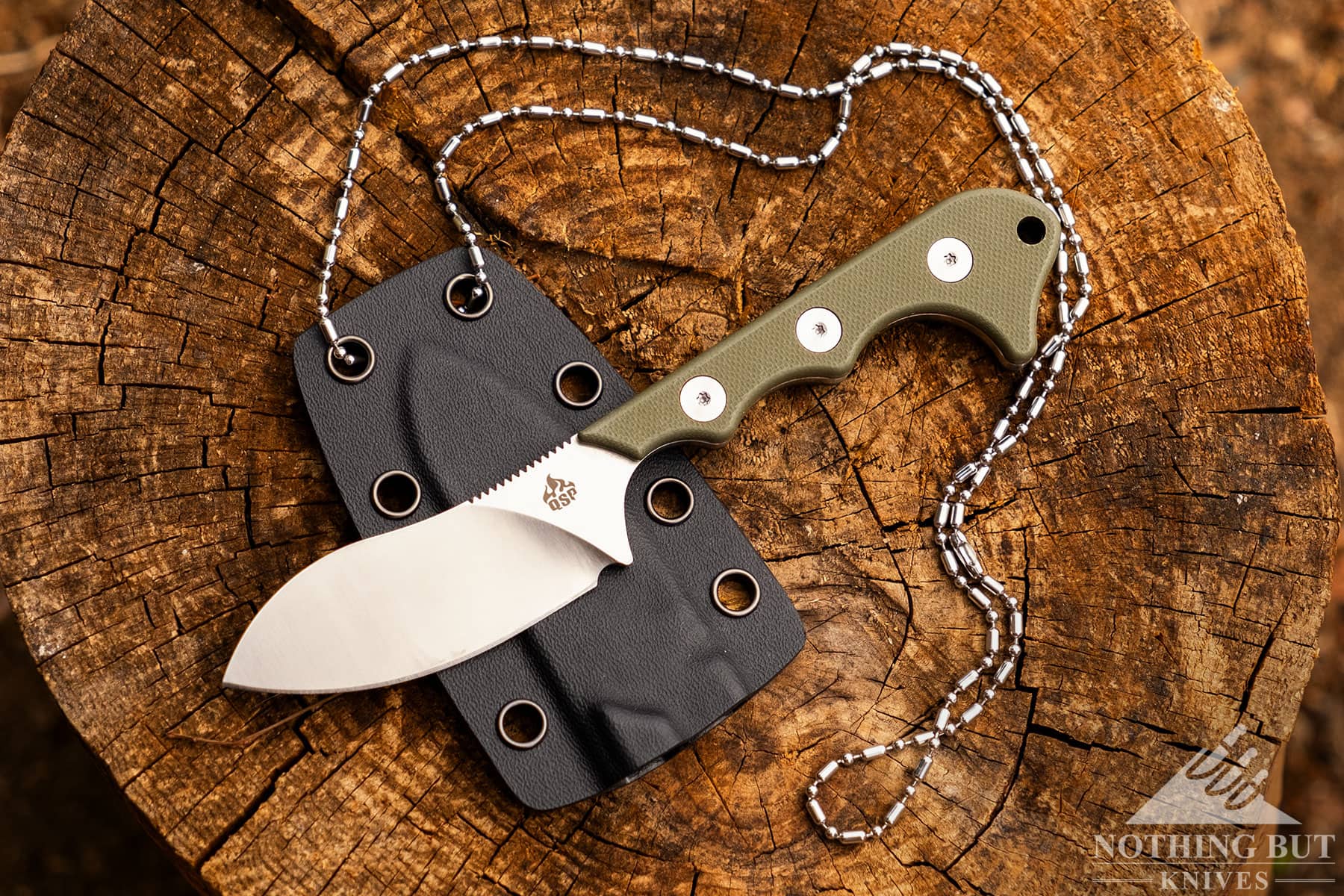
| Overall Length: | 6.50” |
| Blade Length: | 2.875” |
| Steel: | D2 |
| Blade Style: | Nessmuk drop point |
| Handle Length: | 3.625” |
| Handle Material: | G10 or Micarta |
| Grind: | Flat |
| Build: | Full tang |
| Sheath: | kydex |
| Price Range: | $20 – 30 |
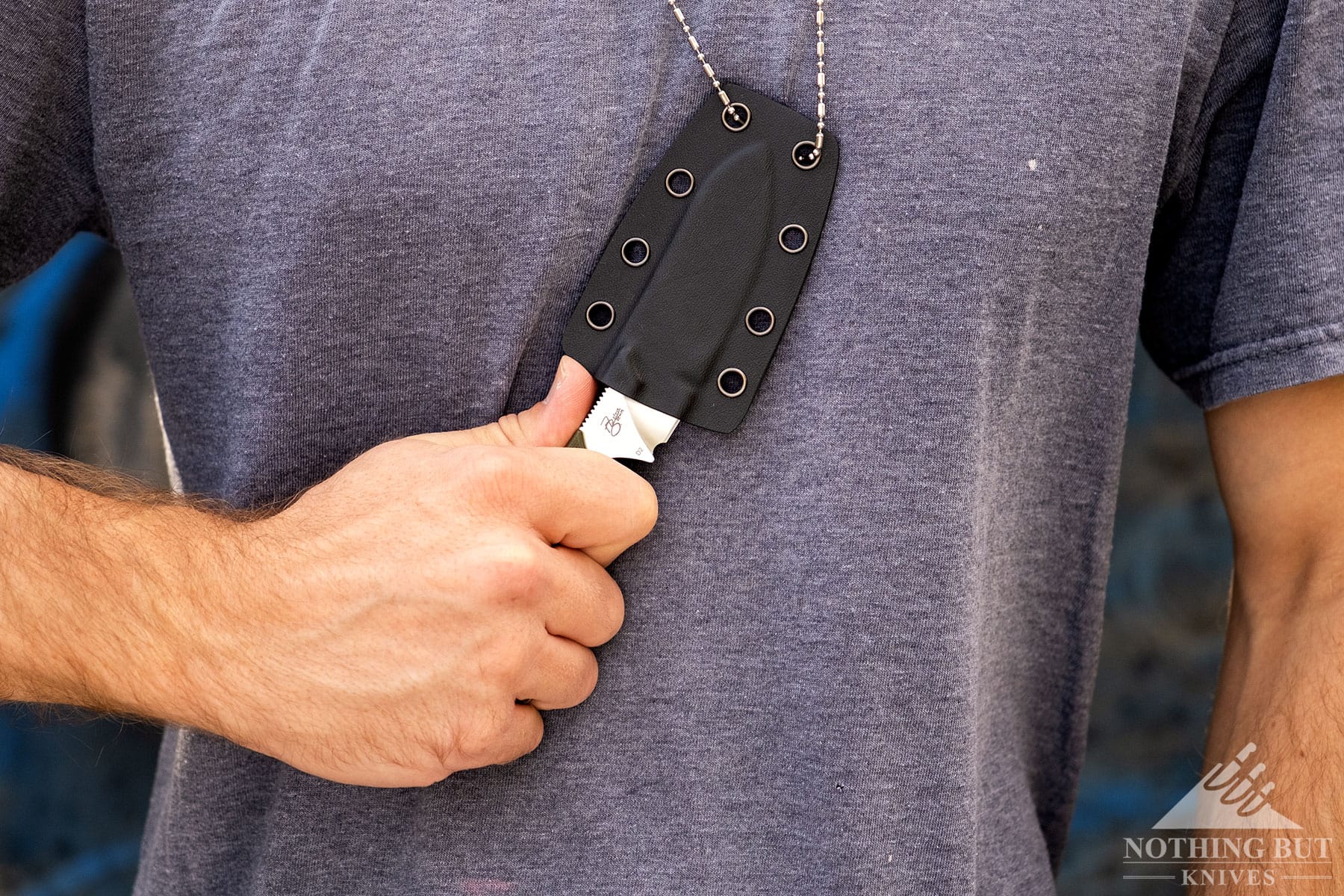
If you want grip security, this is where all of it is at.
That duck-head style of handle is great at locking your grip in, and enough handle sticks out from the sheath that it’s easy to grip and you have a full grip on the knife as soon as you deploy it.
That all sounds like tactical talk, though, and that’s not really what this knife is for. That’s a nessmuk blade (maybe you saw where this was going from the name), which makes it nicer for camping. It’s a great knife for carving wood and cutting food.
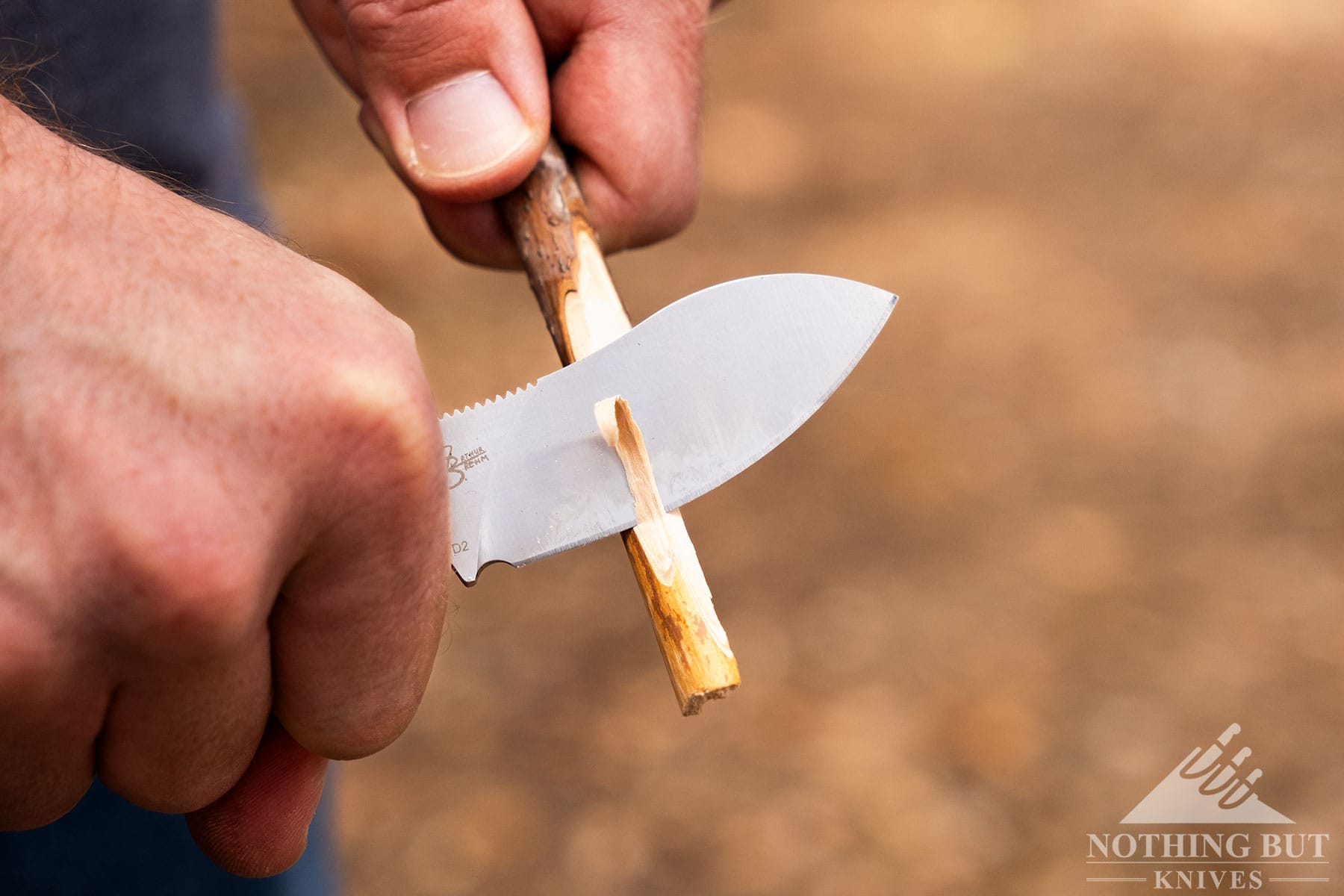
The edge has a hard bite that sinks right into wood, and the small blade is easy to control. The shape of the handle might get in the way if you need to shift into a reverse grip or chest lever, but otherwise it’s a smooth carver.
The retention on the sheath is on the lighter side, which made me nervous at first, but it’s held on through some pretty sloppy hiking.
Just make sure that handle doesn’t hook onto something.
TOPS 3 Pointer
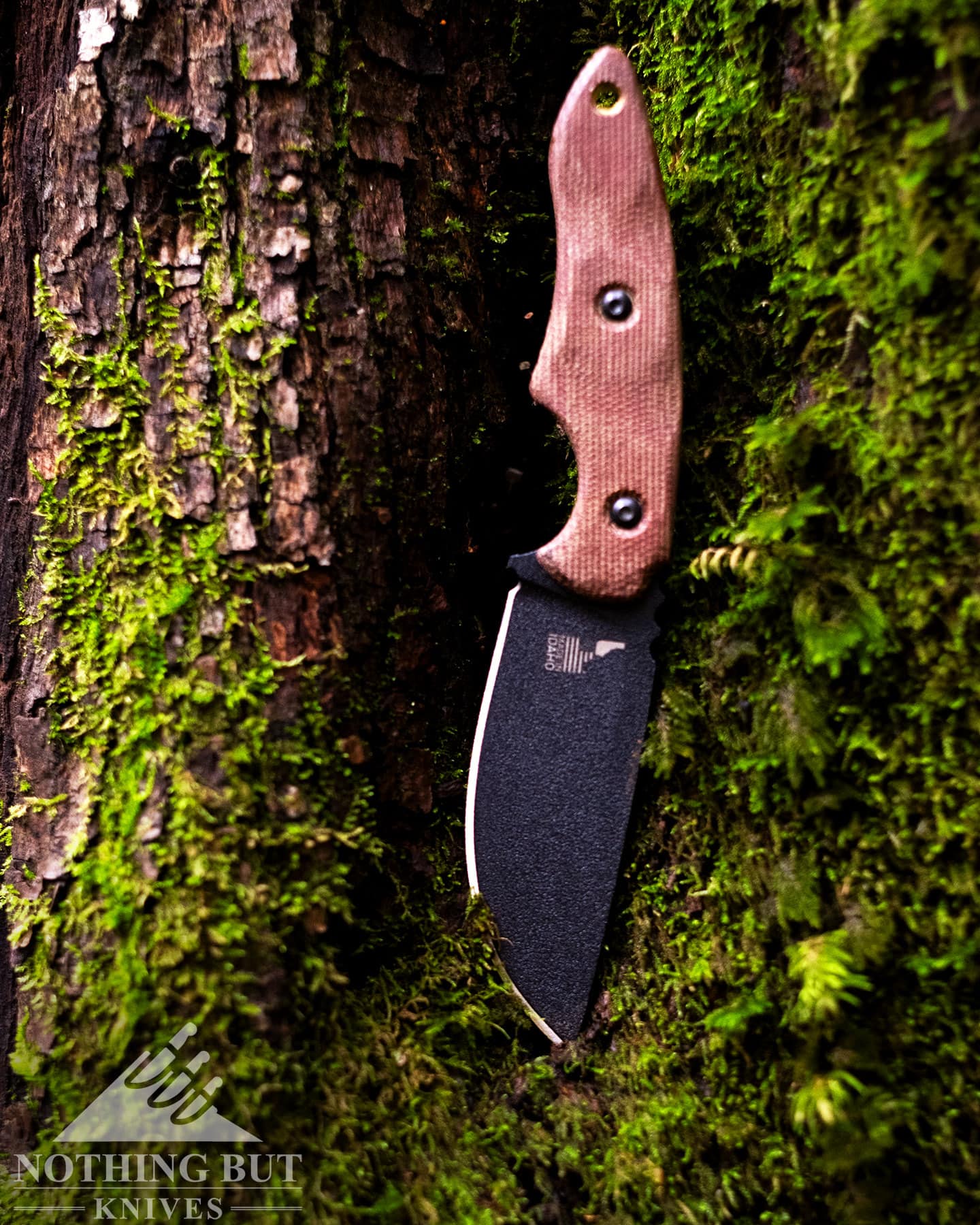
| Overall Length: | 6.5″ |
| Blade Length: | 3.0″ |
| Steel: | 1095 |
| Blade Style: | Drop point |
| Handle Length: | 3.5″ |
| Handle Material: | Micarta |
| Grind: | Flat |
| Build: | Full tang |
| Sheath: | Kydex |
| Price Range: | $90 – 125 |
This easily enters the category of “most comfortable neck knives”. It’s also the most expensive, but there are reasons for that price.
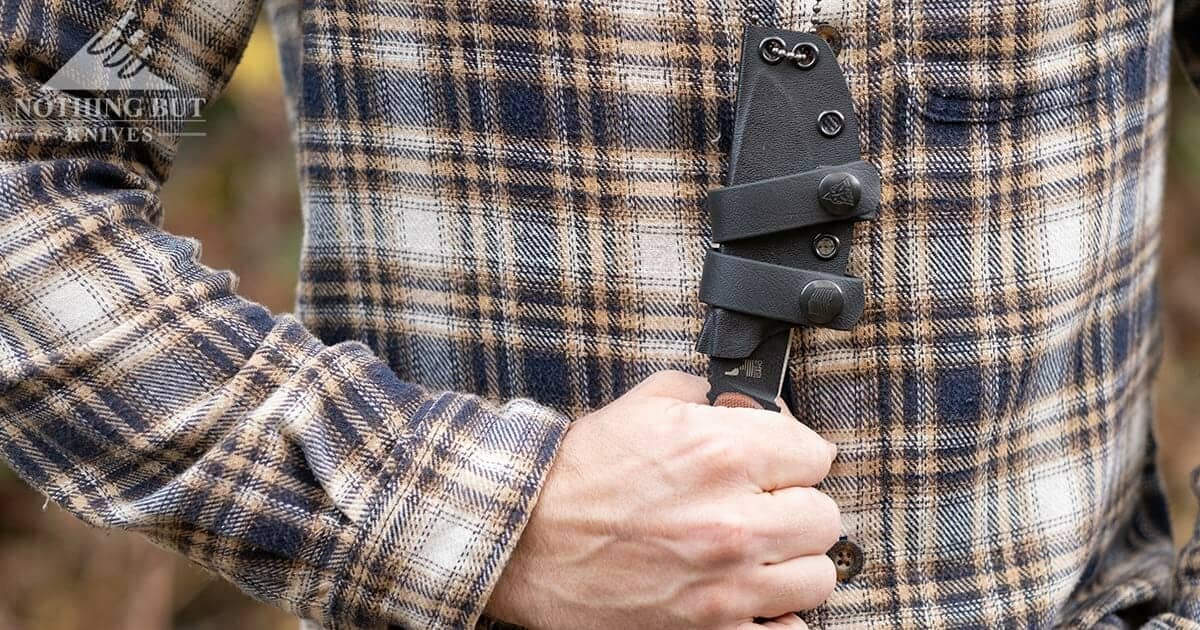
For one, this is just a lot more knife than most neck knife designs. The blade comes in at three inches with a pair of thick Micarta scales. The blade is also fairly tall for its size so the edge gets a nice big curve.
The Kydex sheath comes with a pair of leather straps that wrap around and button into themselves, which makes it really easy to strap to your belt or backpack. Those straps will probably hang a little loose on whatever you put the knife on, but the buttons are pretty secure.
The really cool thing about the knife is that everything on it is changeable. The scales can be taken off with a torx screwdriver and the straps can be taken off and switched around with a phillips screwdriver. Plus they’ve folded a generous thumb ramp on the sheath so it’s fairly easy to push the blade past the aggressive retention of the sheath.
Sheath retention is close to a sweet spot. It’s heavy for a neck knife, and I think I’d like it feel a little tighter, but it holds on fine as is. At least, we haven’t lost it yet…
Condor Pangui
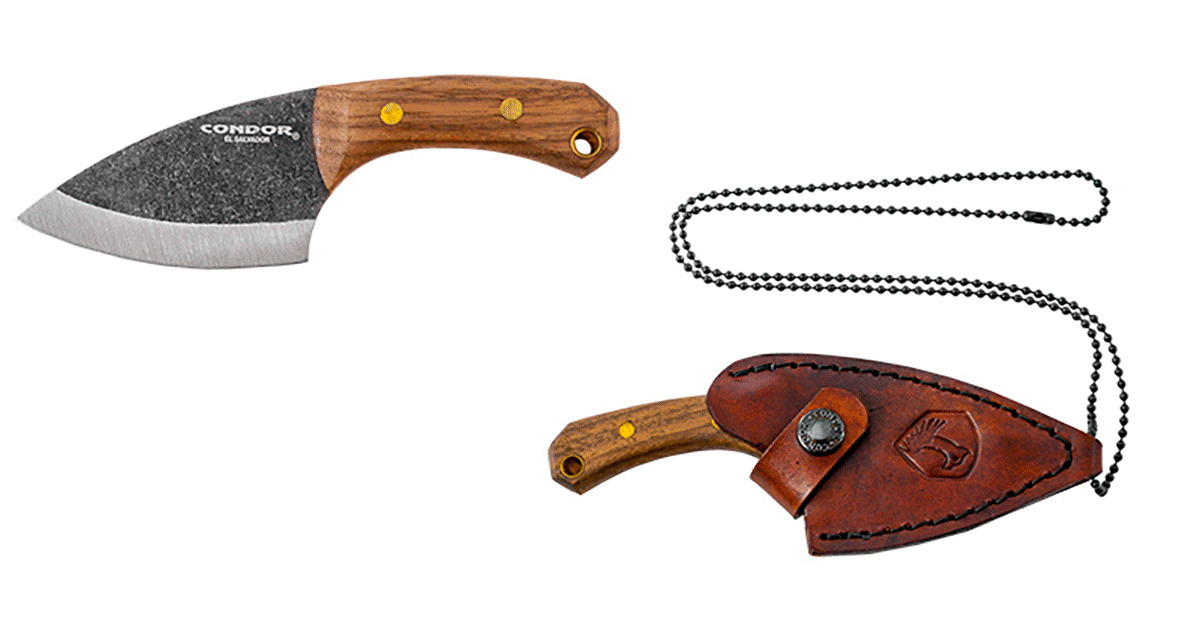
| Overall Length: | 6.25″ |
| Blade Length: | 3.25″ |
| Steel: | 1095 |
| Blade Style: | Drop point |
| Handle Length: | 3.0″ |
| Handle Material: | Walnut |
| Grind: | Scandi |
| Build: | Full tang |
| Sheath: | Leather |
| Price Range: | $60 |
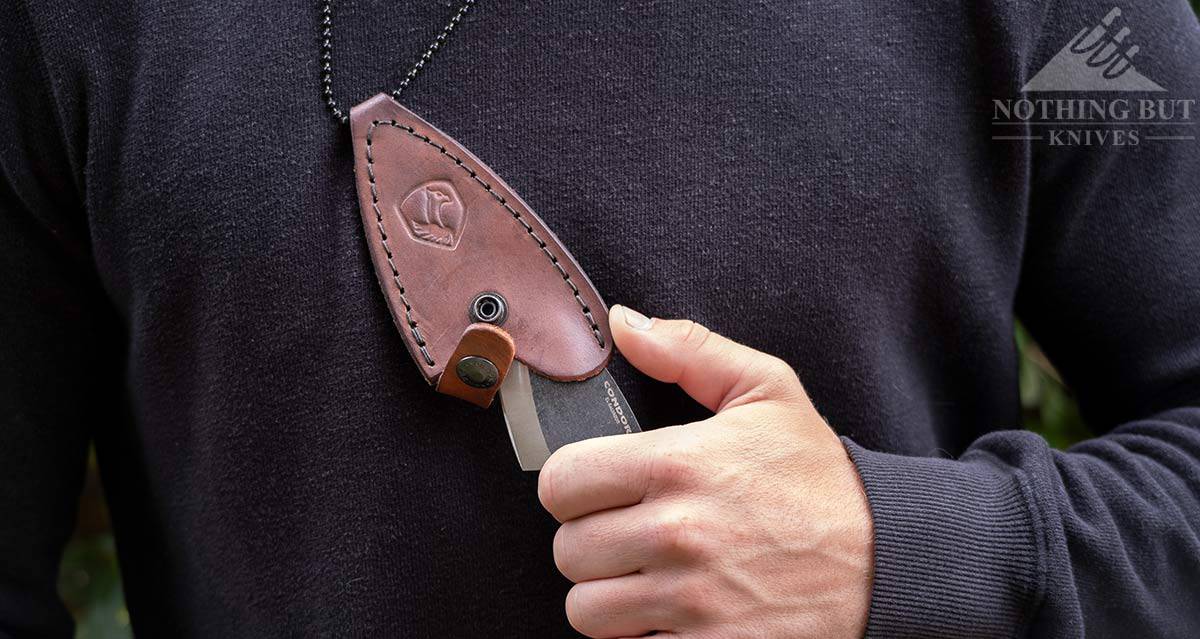
This is definitely the nicest looking knife on the list with the possible exception of the 3-Pointer, but Condor has a knack for making really good knives with a rustic look.
The Pangui comes in 1095 carbon steel with a wood handle, and a massively wide blade that covers a good range of uses that most other neck knives might not be able to manage.
The sheath might not be ideal for everyone. Leather isn’t great for taking into extreme weather, but it is sturdy, and the snap-on strap is a pretty good way to keep a larger blade like this in place when you’re wearing this thing around your neck.
Plus the strap snaps on both sides of the sheath, so this knife works well for both left and right handed people.
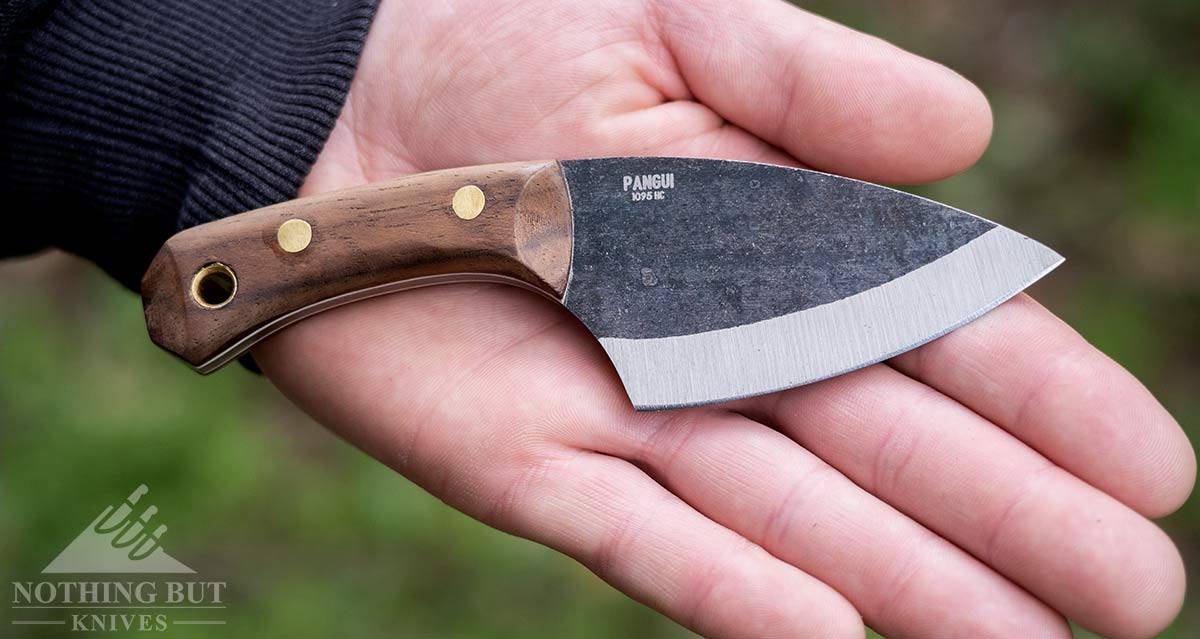
The Condor Pangui is bigger and heavier than most other neck knives, but its size helps to make it a pretty handy camp knife. It is definitely better at food prep than any other knife in this article.
Tactical Neck Knives
If you’re searching for neck knives, you’ve probably already come across 30 blogs listing the “best neck knives for tactical use” (ahem).
I don’t get the obsession. Unless I’m in a car, a neck knife is the last thing I’d reach for in for tactical purposes, but here we are, recommending tactical neck knives like a bunch of crazies. I hope you’re happy with yourself.
Ka Bar TDI LDK
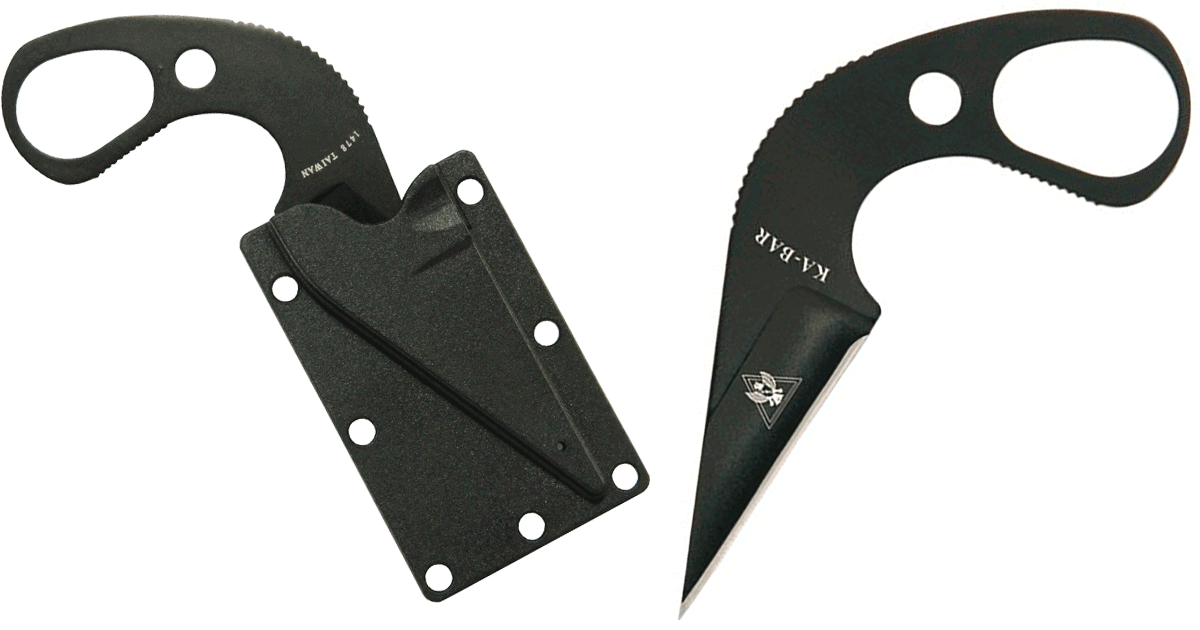
| Overall Length: | 5.6″ |
| Blade Length: | 2.31″ |
| Steel: | AUS-8 |
| Blade Style: | Drop point |
| Handle Length: | 3.32″ |
| Handle Material: | Steel |
| Grind: | Hollow |
| Build: | Skeleton |
| Sheath: | Polymer |
| Price Range: | $30 – 60 |
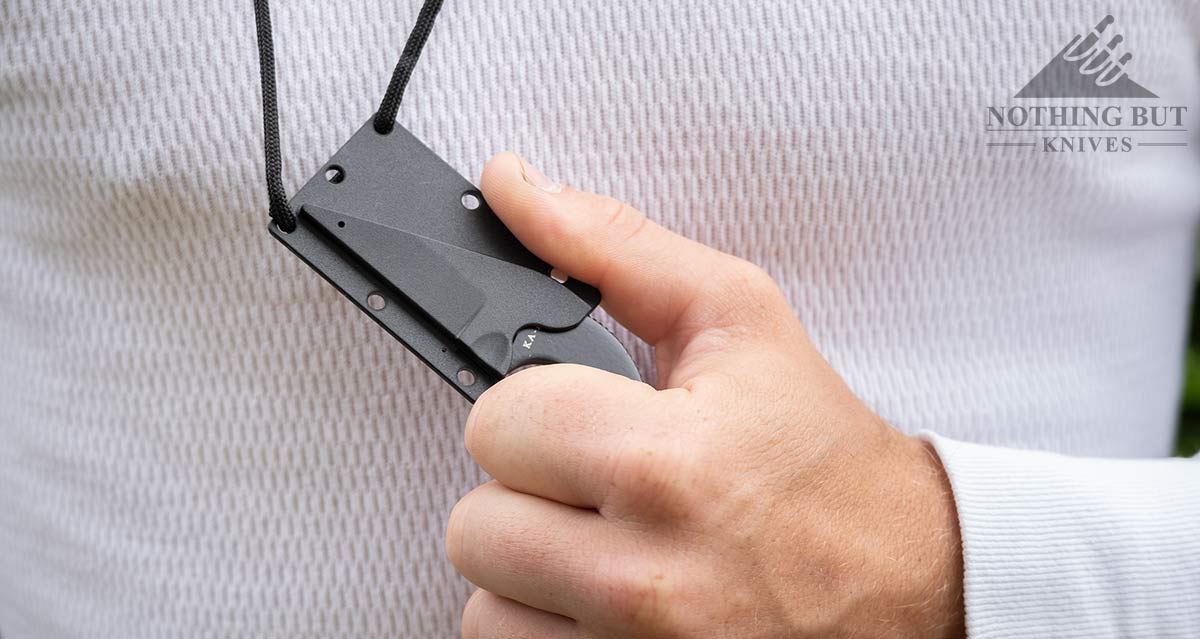
There are very few conversations about neck knives that the Ka Bar TDI doesn’t belong in.
Ka Bar made something pretty ingenious when they put the curve on the handle of this knife. Even more so when they made the sheath with a big wide clip. I’ve heard the favored method of wearing this knife is actually inside the line of the pants appendix-carry style, but it’ll sit comfortably almost anywhere you clip it.
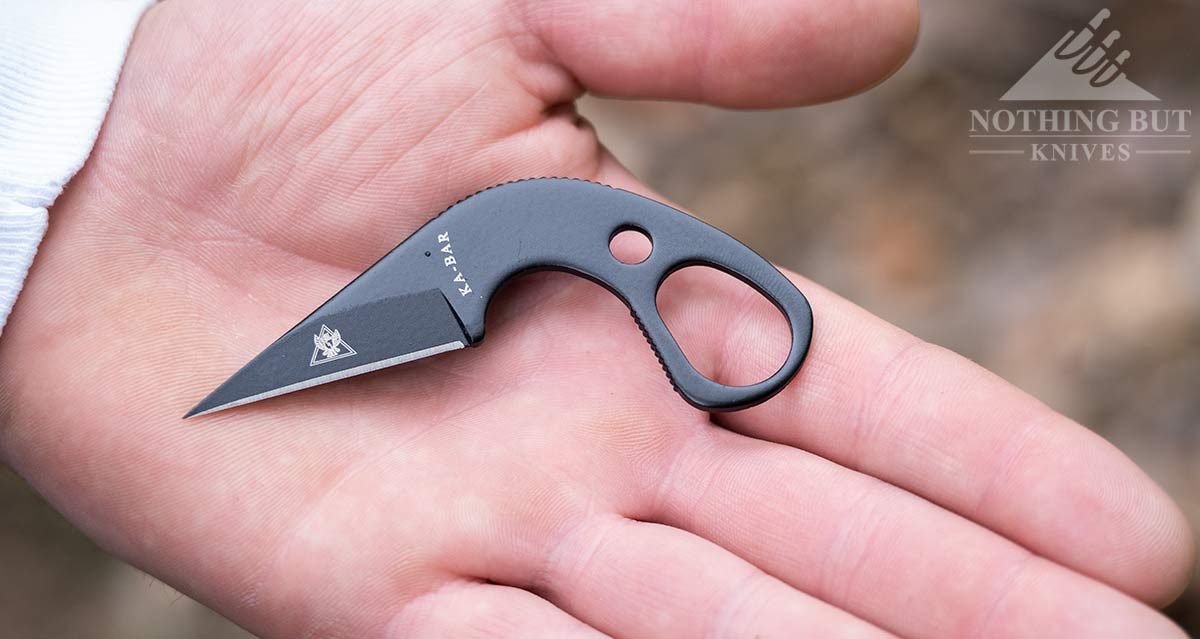
Favored by (and apparently designed by) law enforcement officers, this thing is made for close quarters combat. Anything this sharp and pointy has about a million uses though, and they put a pretty extreme hollow grind on the blade that would be nice for breaking down cardboard.
Spyderco Shirly-Owens ARK Neck Knife
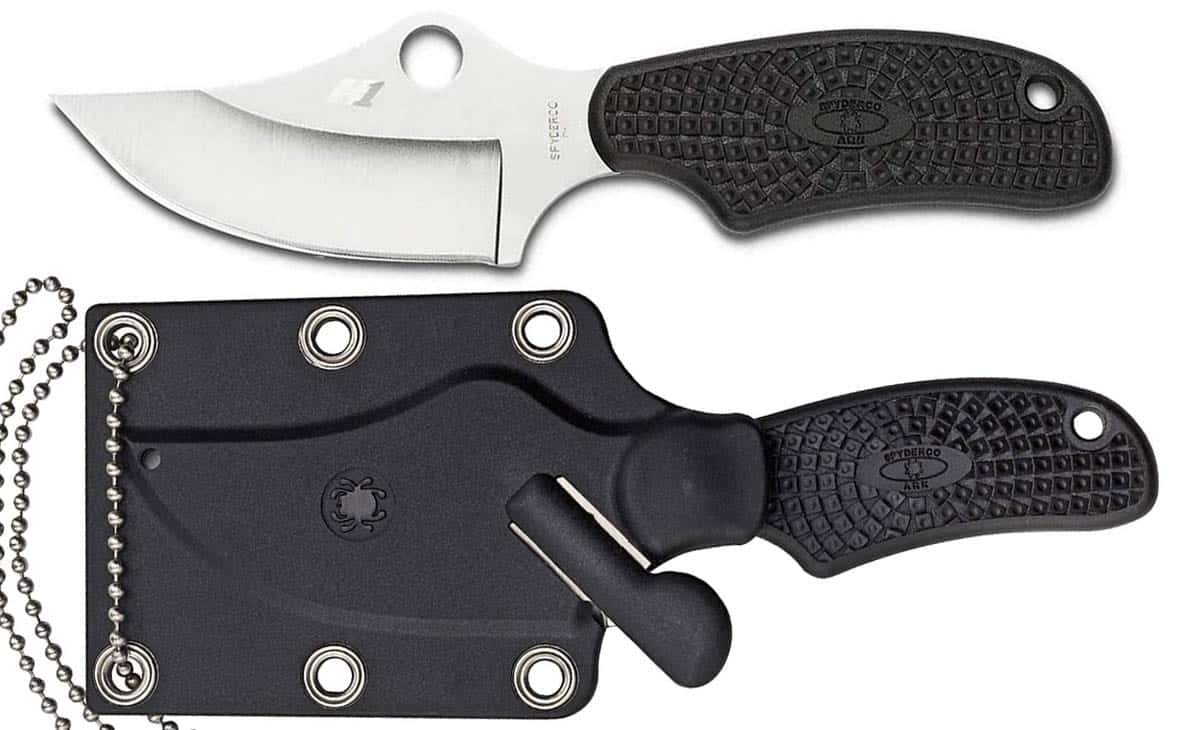
| Overall Length: | 5.0″ |
| Blade Length: | 2.6″ |
| Steel: | H1 |
| Blade Style: | Clip point |
| Handle Length: | 2.33″ |
| Handle Material: | FRN |
| Grind: | Hollow |
| Build: | 3/4 tang |
| Sheath: | Polymer |
| Price Range: | $68 – 70 |
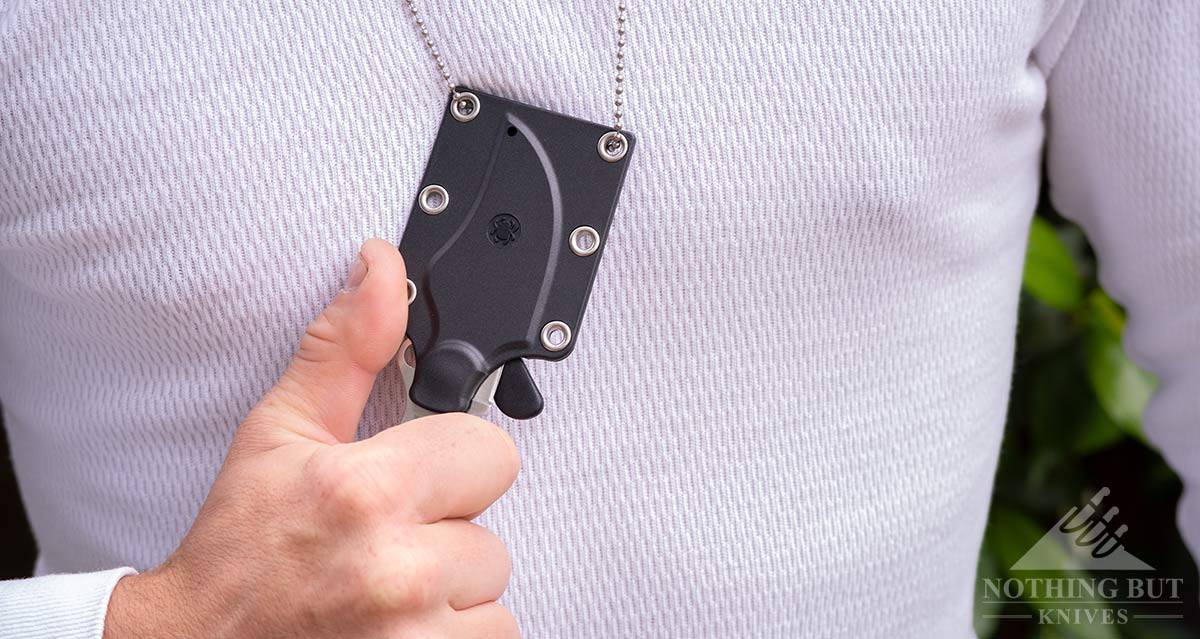
The ad copy for this knife usually says the ARK was made to be a self defense tool, but I’ve seen a lot of knives made for skinning boar that have a very similar blade shape.
I’ll defer to what the designers intended, though. Personally I don’t like the design for tactical purposes, but there’s something to be said for the slashing ability from the dramatic curve of the edge. Don’t let the advertising make you pigeonhole this knife, though. This seems like a great blade to have on a hunt.
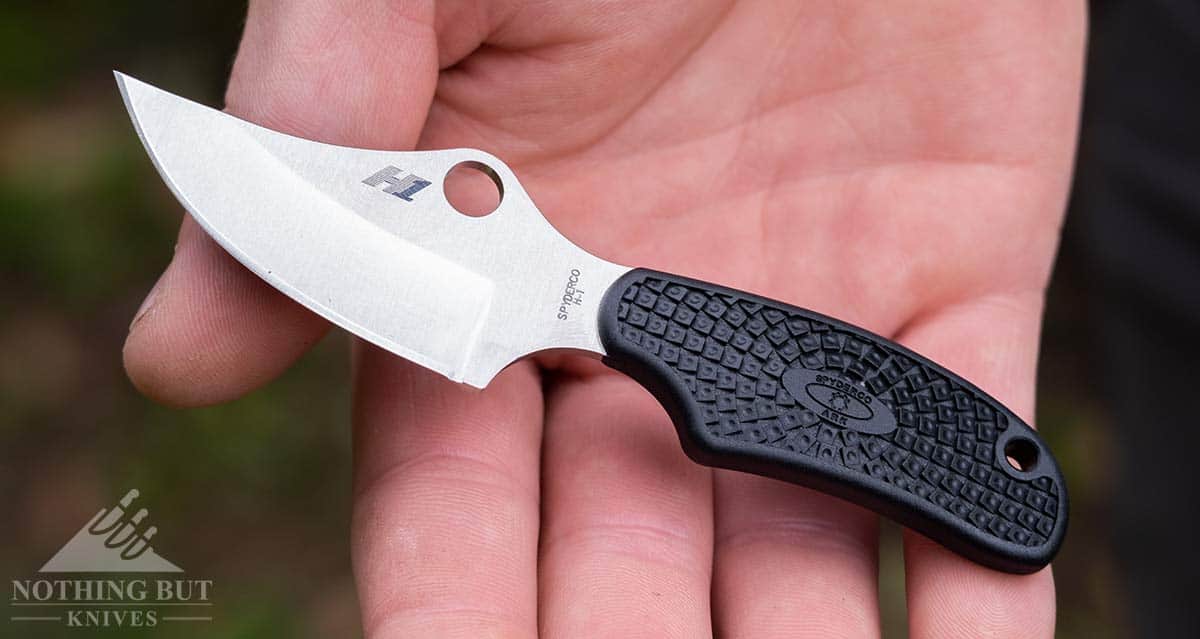
It takes a little practice to get the hang of the retention tab, but one-handed draw is pretty seamless once you get the hang of it. This knife is so light and small, though, it doesn’t really need that much retention to stay in the sheath.
This would actually be a pretty good knife for jogging or fishing, thanks to the H1 steel. It’s super corrosion resistant, so sweat and water and fish guts don’t pose as much of a rusting danger as it would to even AUS-8 or 8Cr steels. Plus, the shape and rough texture of the handle provide a pretty firm grip within the little material available. Overall it’s a really impressive little design.
Cold Steel Mini Tac
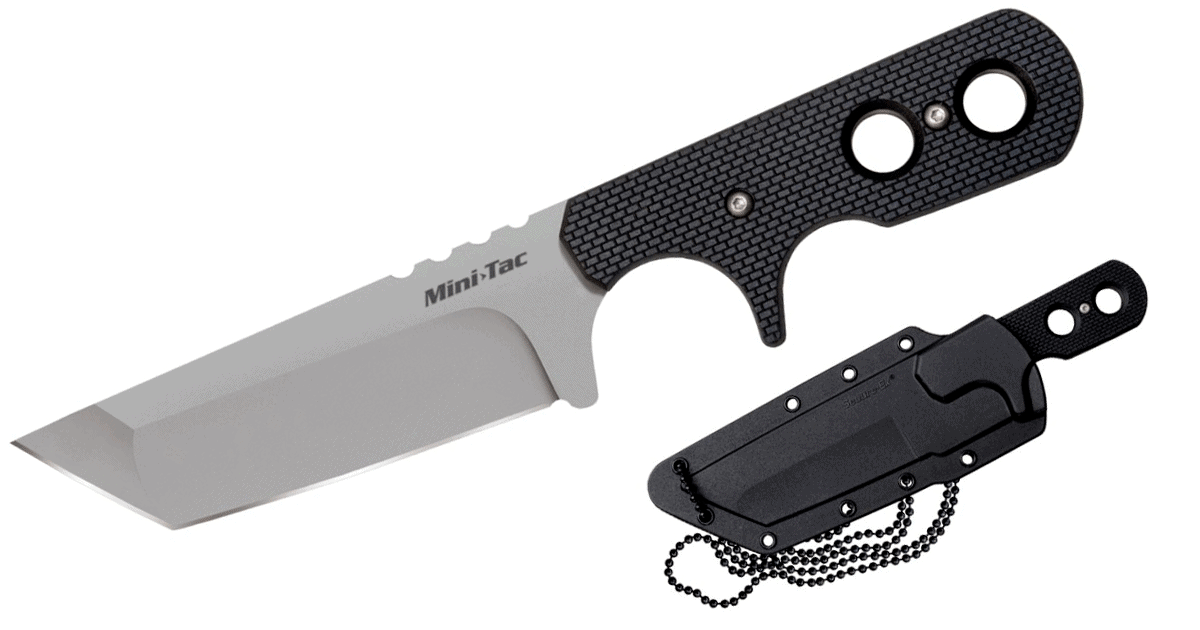
| Overall Length: | 6.75″ |
| Blade Length: | 3.75″ |
| Steel: | AUS-8 |
| Blade Style: | Tanto |
| Handle Length: | 3.0″ |
| Handle Material: | G-10 |
| Grind: | Hollow |
| Build: | Full tang |
| Sheath: | Polymer |
| Price Range: | $25 – 30 |
This was one of the first neck knives we reviewed on this site, and it still holds up pretty well.
It’s surprisingly comfy for the size, feels light around the neck, and the sheath has a pretty good balance of retention strength and deploy-ability.
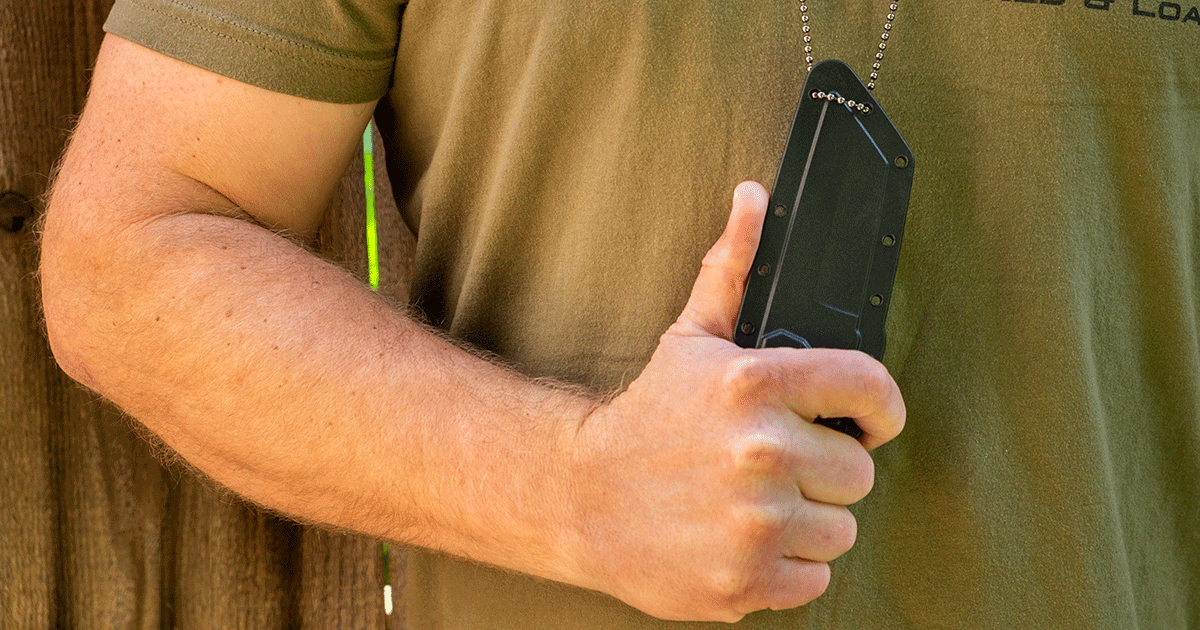
I really like thick tanto blades on smaller knives like this. You’re not supposed to use knives as pry bars, but I do anyway, and this type of knife with a stout tip and a thick spine (and low price tag) is a great emergency pry bar.
The jimping is also nice and makes the Mini Tac a good candidate for push cuts as well if you want to use a knife the way it was intended.
If you’d like to know our full opinion of it, read our review of the Cold Steel Mini Tac here.
Kizer Groom
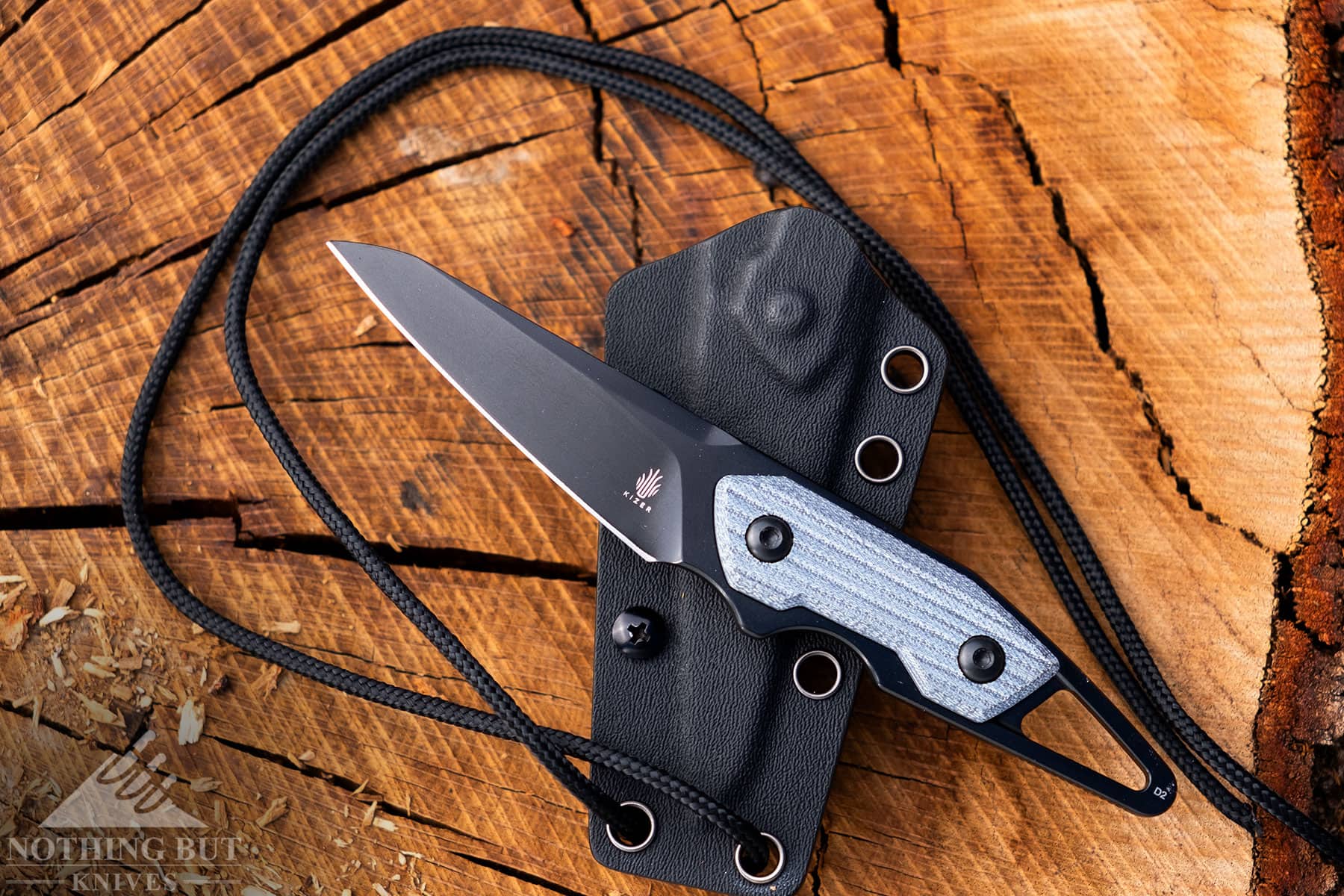
| Overall Length: | 3.08″ |
| Blade Length: | 3.66″ |
| Steel: | D2 |
| Blade Style: | Drop point |
| Handle Length: | 6.74″ |
| Handle Material: | Micarta or Carbon Fiber |
| Grind: | Flat |
| Build: | Full Tang |
| Sheath: | Modular GFN |
| Price Range: | $45 – 55 |
The relatively long blade of the Groom makes it a good choice for a tactical neck knife. The blade shape while technically a drop point borders on spear point, so it has more piercing power that many of the other knives in this article.
The handle has a skeletonized look to it, but the small pieces of Micarta covering 3/4 of the tang help a lot from a comfort and grip standpoint. This is especially true when the knife is wet.
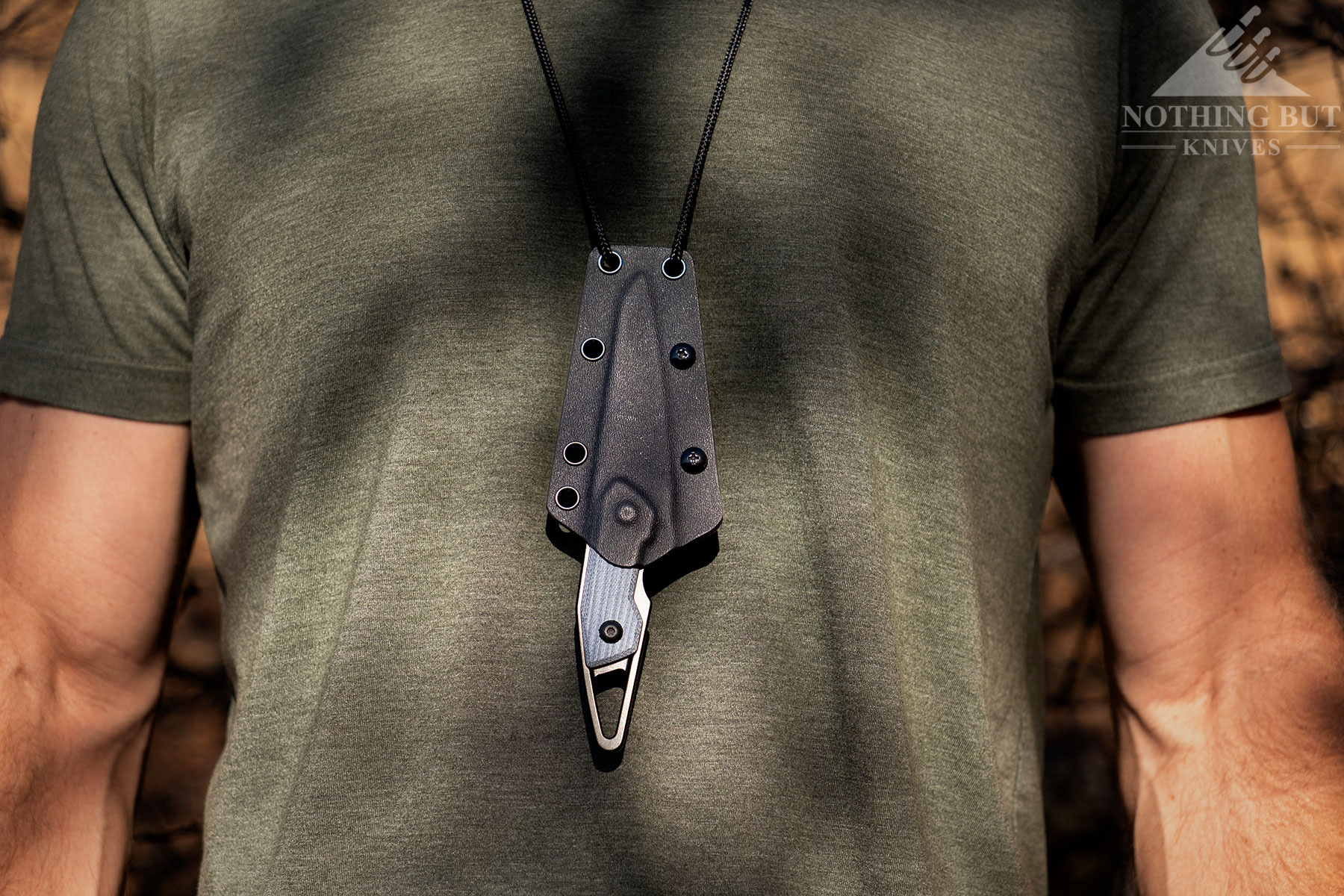
The Kizer Groom replaced the much loved but discontinued Gerber Ghostrike in this article which is appropriate because the Groom is one of the few neck knives that are as versatile as the Ghostrike. The Groom can be worn vertically or horizontally on a belt or in a pocket (depending on the size of your pockets) or around the neck with the included lanyard.

Why do some of these knives have a California Prop 65 warning on them?
Because California requires that labeling for products sold in their state. It is kinda weird and probably a pain for manufacturers, but California is not known for being business friendly.
A lot of the smaller knives have a finger hole making it illegal in NYC. Anything with a hole that your finger can fit through is classified as an illegal knuckle knife here.
Looks like that should only apply to the Schrade SCHCC1 and the BK14, but that’s definitely a handy detail to know. Thanks for the heads up.
I just came across your site, I’m really enjoying it so far. Check out White River Knucklehead II as a neck knife. Excellent kydex sheath, small, skeletonized handle with the most important feature, a bottle opener! Seriously it’s a great little knife, I wear it every time I head out hiking or camping.
I’ve been on a few camping trips now where the bottle opener was the most used feature on one of my knives. The Knucklehead looks super interesting. Almost like a multitool. I’ll have to try to snag one up next time White River gets a batch out.
Great article! I really enjoyed it! I’ve been looking at the Esee Gibson Pinch as an ultralight backpacking option. Super small but seems like a stout mini blade. Any experience with the Pinch or maybe the Esee Candiru if the Pinch is too small for practical purposes?
I haven’t used the Pinch personally, but I love the concept of it. The Candiru looks close enough to the Izula that I’d expect to function the same, just in a smaller package. Generally I trust ESEE to make a good practical knife. You just have to remember that they tend to make their knives to be modified, so sometimes you have to play with the factory edge to get it cutting the way you prefer for what you’ll be doing.
A pretty solid list. Most of the specs are correct (with a few exceptions) buy I enjoyed the picks, and I thought the assessments of each blade were succinct and comprehensive. I think I would really enioy more lists like this for some other categories. Thanks very much, keep up the good work. Don’t forget to double check specs, as some distributor sites make mistakes as well. Cheers.
I appreciate you reading, Matthew, but I can’t shake the feeling that we’ve just been given a 75/100 by a bored college professor.
Best reply ever. Bullseye!
Enjoyed the read. The most important knife is one you have with you so it is important to pick your EDC with what you do most. Mine is a 1 inch folder key ring knife by VICTORINOX with a Philips and straight driver on it. Was not cheap at 29$. I have tried neck knives but never really settled on one. Just bought the KA-BAR ESEE BK14. Ka-Bar is good so I hope I like this one.
Thanks again for a good article. I give you 100/100. lol
That’s a better grade than I normally get, so thanks for reading, Doug.
I realize this article is a little old but just a word of advise from a disabled vet. NEVER NEVER use a neck knife with a Paracord necklace or leather, reason being no matter how big you are someone is always bigger and if the get behind you and tighten down on that Paracord or leather it’s lights out. Stick with the dog chain that’s still sturdy enough to carry the knife but will break before to much pressure can be applied. Please trust me on this. Take care
The article is actually not static. It is updated regularly. Your view on paracord is true for anyone carrying a knife for tactical reasons, but many people carry a neck knife for tasks that are far from tactical.
Are there any neck knives with 5-6” blades?
My husband asked for such as his Christmas gift.
Something like the Ka-Bar Ek Commando Short might be good since the belt system can be taken off pretty easily.
Maybe the Cold Steel SRK would work here too. I trust the retention of both those sheaths.
To me that size really pushes the boundaries of neck-knife carry, so I’m a little lost on recommendations, but those are the best I can think of on the spot.